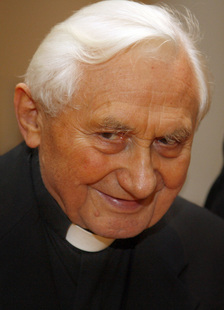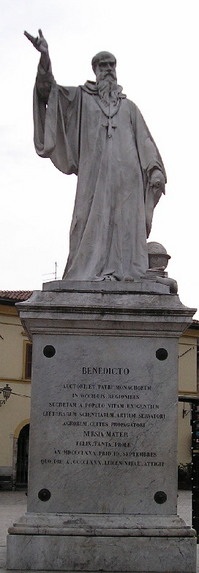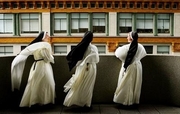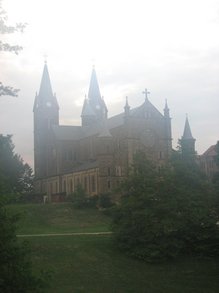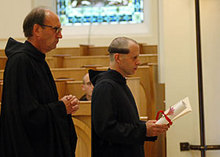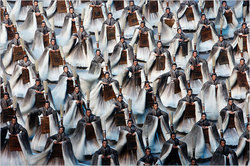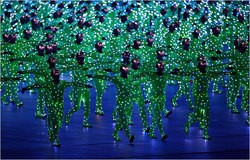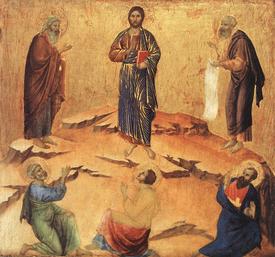August 2008 Archives
Recently, Bishop Gregory Mansour and Sister Marla Marie took up Pope Benedict's idea
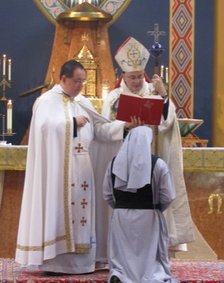 of spiritual motherhood with an application to the Maronite Eparchy of Saint Maron. The Maronite Servants of Christ the Light will be working in the parishes of the eparchies by assisting the laity and clergy with programs oriented toward religious education, family life, youth and the elderly. Pretty all-encompassing!
of spiritual motherhood with an application to the Maronite Eparchy of Saint Maron. The Maronite Servants of Christ the Light will be working in the parishes of the eparchies by assisting the laity and clergy with programs oriented toward religious education, family life, youth and the elderly. Pretty all-encompassing!
The sisters in the new order will live the communal life of the convent, through contemplative prayer, meals, fellowship, silence and solitude, and exercise and rest, even as they do pastoral work in parishes. Daily prayer will involve communal recitation of the Divine Office, daily Divine Liturgy (Mass), Eucharistic adoration, spiritual reading, and recitation of the Rosary. A prayer life centered on the Eucharist and devoted to Mary will be "our whole-hearted response to God and the source to nourish us to live in community and serve in the apostolate of parish life."
Bishop Gregory said of the new group:
"The contribution made by consecrated women in the Church is beyond measure. The Maronite Church is no exception. The time has come for the Eparchy of Saint Maron to foster and sponsor a community to assist the priests in the pastoral care of the Eparchy. Sister Marla Marie Lucas has approval to do just that. She and the Maronite Servants of Christ the Light will begin officially (ad experimentum) this June 2008. Please find below an article on this new beginning. Pray for her and please support this effort so that women who feel called to make a complete gift of self in consecrated service to Christ and His Church may find a home in the Maronite Servants of Christ the Light."
More info is found here and here, and the blog.
Bishop Gregory J. Mansour recently wrote this piece on resentment for the Maronite Voice, the monthly magazine for the two Maronite eparchies in the United States. I think this brief article on resentment is helpful and will open new doors as to how we know ourselves and relate to others. For me it is clear, if we get our "house in order" then living as are made for becomes easier.
Thirty years ago, in his ground-breaking book on spirituality, the late Father Henri
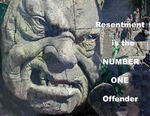 Nouwen described the spiritual life as a series of interior movements in which we go beyond our own self-centered plans in order to reach a deeper communion and authentic love for God and others. The book is appropriately entitled Reaching Out.
Nouwen described the spiritual life as a series of interior movements in which we go beyond our own self-centered plans in order to reach a deeper communion and authentic love for God and others. The book is appropriately entitled Reaching Out.
A movement "from resentment to gratitude" is described in the book. Father Nouwen says we ought to move from resenting the fact that we were not chosen, not honored, not loved or treated well, to a newfound gratitude for what we have been given, even a gratitude for the valuable lessons we learned from ill treatment. This can only happen when we are honest with ourselves and have the courage to feel once again our hurts and admit that God's grace brought us through. In this way we maintain balance and can love others with a clean heart and peace of mind.
This "re-sentiment" (which literally means "feeling again") allows us to bring all our hurts and disappointments to God, Healer and Lover of Mankind, and to turn from a bitter resentment to an inner peace and gratitude.
The destructive power of resentment abounds in society and even in the Church but so,
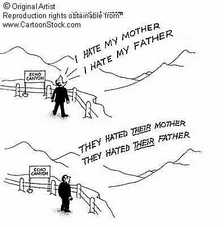 too, can gratitude. A deep spiritual conversion can take place with God's grace, even in those who have been harshly treated. We see this in the lives of those who forgave their tormentors in war and imprisonment. Likewise, we see it in the lives of those whose sons, daughters, parents, spouses or friends have been innocently harmed or even killed. There are many examples of awe inspiring forgiveness from those who have been hurt, deprived, or disappointed and yet have found the power to forgive and to live the presence of God in peace and gratitude. It is true also of the like of the saints, from St. Stephen to the martyrs of today.
too, can gratitude. A deep spiritual conversion can take place with God's grace, even in those who have been harshly treated. We see this in the lives of those who forgave their tormentors in war and imprisonment. Likewise, we see it in the lives of those whose sons, daughters, parents, spouses or friends have been innocently harmed or even killed. There are many examples of awe inspiring forgiveness from those who have been hurt, deprived, or disappointed and yet have found the power to forgive and to live the presence of God in peace and gratitude. It is true also of the like of the saints, from St. Stephen to the martyrs of today.
The seeds of new life and peace are present in every difficulty but we cannot see them without the belief in the power of love and a loving God. We must believe God's grace can transform resentment into a life-giving gratitude. This is the meaning of the Cross. Resentment kills, but if we have the courage to face our resentments honestly and to reach out in love, then in the power of the Spirit of Jesus Christ, a sense of gratitude can bring new life, and as Jesus said, " I came to give life, life in abundance" (John 10:10).
This article was first published in the Maronite Voice in August 2008.
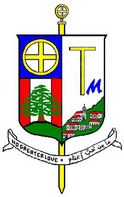 About the Author The Most Reverend Gregory John Mansour is the third eparch of the Eparchy of
Saint Maron, Brooklyn. A native of Flint, Michigan, Mansour was educated at Western Michigan University, Our Lady of Lebanon Maronite Seminary, the Catholic University of America, and finally at the Pontifical Gregorian University. He is a teacher of Spiritual Theology. Pope John Paul II named Bishop Gregory to the Brooklyn eparchy in 2004.
About the Author The Most Reverend Gregory John Mansour is the third eparch of the Eparchy of
Saint Maron, Brooklyn. A native of Flint, Michigan, Mansour was educated at Western Michigan University, Our Lady of Lebanon Maronite Seminary, the Catholic University of America, and finally at the Pontifical Gregorian University. He is a teacher of Spiritual Theology. Pope John Paul II named Bishop Gregory to the Brooklyn eparchy in 2004.
The September 1st issue of America Magazine, the Jesuit weekly, there is a good article
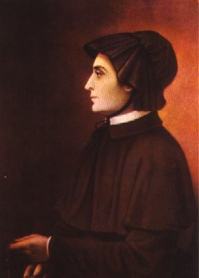 to read on America's first canonized saint, Elizabeth Ann Seton. Sister of Charity Regina Bechtle's article "An American Daughter: Elizabeth Ann Seton and the birth of the U.S. Church" is a good read for those generally interested in matters pertaining to Catholicism in America. Who wouldn't be thrilled to know that Saint Elizabeth Ann Seton is the first American born canonized a saint by Pope Paul VI in 1975?
to read on America's first canonized saint, Elizabeth Ann Seton. Sister of Charity Regina Bechtle's article "An American Daughter: Elizabeth Ann Seton and the birth of the U.S. Church" is a good read for those generally interested in matters pertaining to Catholicism in America. Who wouldn't be thrilled to know that Saint Elizabeth Ann Seton is the first American born canonized a saint by Pope Paul VI in 1975?
What's the point of this "stuff" about Seton in late August when her feast day is in January? Well, for one, August 28th marked her 234th birthday and mid-September marks 33 years since Seton was canonized. Too, this year is the 200th anniversary of Pope Pius VII named Baltimore an "archdiocese" along with 4 other Catholic dioceses.
We might also consider the possibility of making a pilgrimage to one of the shrines dedicated to Seton. In a real sense it is less important that we end up at a holy spot just for doing it than it is to take stock of our spiritual lives with God's grace and with assistance of a particularly singular saint, Elizabeth Ann Seton, who made a deliberate choice to follow Christ through His sacrament, the Catholic Church. (BTW, she was a believing Christian but she did not possess the fullness of Truth as we know it in Catholicism.) A pilgrimage, therefore, may open for us an opportunity to acknowledge the exceptional Presence before us like we've never understood before now. So, what happens to us on the way to a holy shrine is very important indeed. Hence, we follow Christ!
In case you want to visit the shrines of Saint Elizabeth Ann Seton on the east coast there
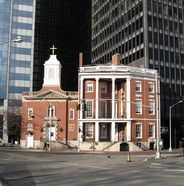 are two:
are two:
1. The National Shrine of Saint Elizabeth Ann Seton, Emmitsburg, Maryland
2. The Shrine of Saint Elizabeth Ann Seton at Our Lady of the Rosary Parish, New York City
Lord God, you blessed Elizabeth Ann Seton with gifts of grace as wife and mother, educator and foundress, so that she might spend her life in service to your people. Through her example and prayers, may we, whose Faith Community is dedicated in her honor, learn to express our love for you in our love for all your children. We ask this through Christ, Our Lord. Amen.
WARSAW, Poland (CNS) -- Chinese Catholic priests are studying at a Benedictine
 monastery in Germany in what at least one expert on the Chinese church hopes will lead to Chinese contemplative orders. "They're sampling our spirituality and community life ... and will later be returning to their homes in different Chinese provinces in May," said Martin Wind, press officer at St. Ottilien monastery near Munich, Germany. "There's no (current) Christian tradition of monasticism in China, so we wanted to show them what it's like to live in a monastery. Although it isn't our aim, we would be glad if they decided to found a monastic community when they go back." The eight priests have been undergoing "practical training" at St. Ottilien since September 2007, Wind told Catholic News Service in a telephone interview, noting that the visit was "sensitive" and the priests would not be speaking to the media directly. "They haven't talked openly about the possibility of being allowed to set up monastic structures in China, but they wouldn't have come if there was no interest in the monastic life there," said Wind.
monastery in Germany in what at least one expert on the Chinese church hopes will lead to Chinese contemplative orders. "They're sampling our spirituality and community life ... and will later be returning to their homes in different Chinese provinces in May," said Martin Wind, press officer at St. Ottilien monastery near Munich, Germany. "There's no (current) Christian tradition of monasticism in China, so we wanted to show them what it's like to live in a monastery. Although it isn't our aim, we would be glad if they decided to found a monastic community when they go back." The eight priests have been undergoing "practical training" at St. Ottilien since September 2007, Wind told Catholic News Service in a telephone interview, noting that the visit was "sensitive" and the priests would not be speaking to the media directly. "They haven't talked openly about the possibility of being allowed to set up monastic structures in China, but they wouldn't have come if there was no interest in the monastic life there," said Wind.
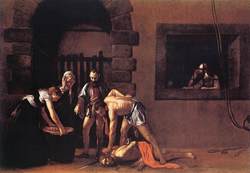 "This great man after a long agony of captivity, ended his life on earth with the shedding of his blood. He who preached the freedom of heavenly peace was thrown into captivity by wicked men. He who was called a burning and shining light by Christ the light, was imprisoned in darkness: he who was granted the privilege of baptizing the Redeemer of the world was given baptism in his own blood" (Saint Bede the Venerable).
"This great man after a long agony of captivity, ended his life on earth with the shedding of his blood. He who preached the freedom of heavenly peace was thrown into captivity by wicked men. He who was called a burning and shining light by Christ the light, was imprisoned in darkness: he who was granted the privilege of baptizing the Redeemer of the world was given baptism in his own blood" (Saint Bede the Venerable).
We beseech Thee, O Lord, may the holy festival of Saint John the Baptist, Thy Precursor and Martyr, obtain for us help unto salvation.
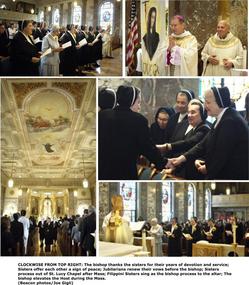 This morning, August 28th, began with the Sacrifice of the Mass offered by Father Jeremiah, a monk of Saint Mary's Abbey, at Villa Walsh, The Institute of the Religious Teachers Filippini. The monks of Saint Mary's Abbey have offered Mass for the sisters for many decades. We had a modest and delightful breakfast with Sister Betty Jean, the Provincial of the Filippini sisters and some other sisters. The sisters' patience with me was grand because I had so many questions about the Congregation; I had never met a Filippini sister before and I was intrigued by their charism.
This morning, August 28th, began with the Sacrifice of the Mass offered by Father Jeremiah, a monk of Saint Mary's Abbey, at Villa Walsh, The Institute of the Religious Teachers Filippini. The monks of Saint Mary's Abbey have offered Mass for the sisters for many decades. We had a modest and delightful breakfast with Sister Betty Jean, the Provincial of the Filippini sisters and some other sisters. The sisters' patience with me was grand because I had so many questions about the Congregation; I had never met a Filippini sister before and I was intrigued by their charism.
The vocation of a Filippini sister, based on what Saint Lucy Filippini and Cardinal Mark Anthony Barbarigo gave to the Church is your fundamental living of the Gospel being a contemplative in action, that is, A Filippini sister has a life of prayer with her life of ministry. Sounds like the Jesuits and other orders founded since the 16th century; and you can see these sisters are serious about their vocation when you meet them. Saint Lucy and the Cardinal founded schools of Christian Doctrine for girls in Italy, ministered to the poor and the sick, conducted retreats and guided the women preparing for marriage. What more does the Church need?
Later in the morning, Father Jeremiah and I ventured to Newark Abbey and Saint Benedict Prep
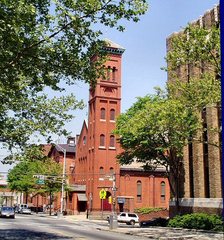 to visit with the Benedictine monks, particularly Brothers Maximilian and Patrick. We prayed Mid-day prayer in a beautiful abbey church, toured the school, Saint Mary's Parish and the abbey. Newark Abbey is the original site of the Benedictine monks of the American-Cassinese Congregation sent by Archabbot Boniface Wimmer in 1857 to Newark. It is from this abbey that Saint Anselm's Abbey and later college where founded in Manchester, NH, and Saint Mary's Abbey in Morristown, NJ. Brothers Maximilian and Patrick were very gracious hosts and great fun. We lunched at The Tops Diner (East Newark) and visited Newark's Basilica of the Sacred Heart. You would not believe the beauty of this cathedral church! Even Pope John Paul II made a visit here and former President William Clinton remarked how surprised he was to see such a magnificent in Newark, New Jersey. A brief video was produced in 2007 by the NJ Star Ledger on the Newark Abbey monks, have a look.
to visit with the Benedictine monks, particularly Brothers Maximilian and Patrick. We prayed Mid-day prayer in a beautiful abbey church, toured the school, Saint Mary's Parish and the abbey. Newark Abbey is the original site of the Benedictine monks of the American-Cassinese Congregation sent by Archabbot Boniface Wimmer in 1857 to Newark. It is from this abbey that Saint Anselm's Abbey and later college where founded in Manchester, NH, and Saint Mary's Abbey in Morristown, NJ. Brothers Maximilian and Patrick were very gracious hosts and great fun. We lunched at The Tops Diner (East Newark) and visited Newark's Basilica of the Sacred Heart. You would not believe the beauty of this cathedral church! Even Pope John Paul II made a visit here and former President William Clinton remarked how surprised he was to see such a magnificent in Newark, New Jersey. A brief video was produced in 2007 by the NJ Star Ledger on the Newark Abbey monks, have a look.
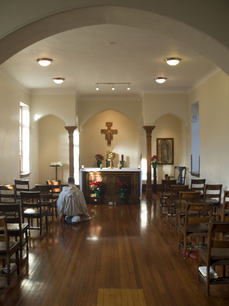 The last treat of the day was the afternoon visit to the Community of the Franciscan Friars of the Renewal based at the Friary of the Blessed Sacrament (Newark, NJ). This is the group founded by Father Benedict Groeschel and seven other Capuchin friars in 1987. The friary was the former the Monastery of Saint Dominic (nuns of the 2nd order of the Order of Preachers). It was indeed a privilege to visit the friary: it was peaceful, prayer-filled and beautiful (much work has been in the 4 years since the coming of the friars). When the nuns moved to other monasteries, their dead were exhumed and reburied in a local cemetery, including the incorrupt body of an extern sister known for holiness, Sister Mary of the Blessed Sacrament who died in 1899. Our host at the friary was Father Richard who graciously illustrated for us the life of the friars: their simple life, their prayer and their clear witness to the Gospel of Jesus Christ. What I experienced was genuine and one which I have confidence is made by God for service in the Church.
The last treat of the day was the afternoon visit to the Community of the Franciscan Friars of the Renewal based at the Friary of the Blessed Sacrament (Newark, NJ). This is the group founded by Father Benedict Groeschel and seven other Capuchin friars in 1987. The friary was the former the Monastery of Saint Dominic (nuns of the 2nd order of the Order of Preachers). It was indeed a privilege to visit the friary: it was peaceful, prayer-filled and beautiful (much work has been in the 4 years since the coming of the friars). When the nuns moved to other monasteries, their dead were exhumed and reburied in a local cemetery, including the incorrupt body of an extern sister known for holiness, Sister Mary of the Blessed Sacrament who died in 1899. Our host at the friary was Father Richard who graciously illustrated for us the life of the friars: their simple life, their prayer and their clear witness to the Gospel of Jesus Christ. What I experienced was genuine and one which I have confidence is made by God for service in the Church.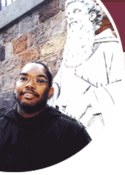
 The Knights of Columbus launch a new Catholic internet news service, Headline Bistro. Stay linked!
The Knights of Columbus launch a new Catholic internet news service, Headline Bistro. Stay linked!
Today is the great feast of Augustine, the convert (at age 32 at the hands of St. Ambrose in Milan) who was ordained a priest in 391 and elected bishop of Hippo in 395. His life and work are remarkable to say the least. In addition to Saint
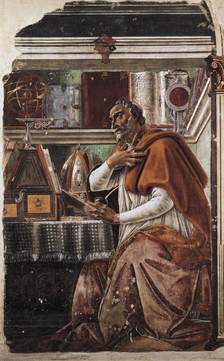 Thomas Aquinas, Saint Augustine is one of the Church's most significant theologians.
Thomas Aquinas, Saint Augustine is one of the Church's most significant theologians.
Calling Augustine "the greatest Father of the Latin Church," Pope Benedict spoke on three occasions in January 2008 to the gathered people in Vatican City about Augustine's life, his thought and his pastoral ministries. The texts of the Pope are found here:
In the meantime, I offer a 1930 text by Pope Pius XI on Augustine together for our reading pleasure right now.
For to begin with the queen of all the virtues, our Saint, leaving all else aside, made the love of God so completely the goal of his desires and efforts, and fed its flame so steadfastly in his soul, that he is fittingly portrayed as holding in his hand a burning heart. No one, who has even once turned the pages of the "confessions," can forget the conversion between mother and son, at the window of the house in Ostia. The narrative, with its lifelike charm, makes us feel that we see Augustine and Monica there, side by side, absorbed in the contemplation of heavenly things. He writes: "Alone together we held most sweet converse. Forgetting the things that lay behind and stretching out to those that were before, we questioned each other, in the presence of Truth, which Thou art, about the nature of the eternal life of the Saints, which eye has not seen, nor ear heard, nor hath it entered into the mind of man to conceive. Mentally with parted lips we hung over the supernal rills of Thy fountain--the fountain of life with Thee--if happily we might be refreshed, so far as our condition would allow, and in some sort ponder so profound a mystery... And while we conversed with eager longing, with the heart's supreme effort we made some approach thereto. We sighed and there left fettered the firstlings of the spirit, then to return to the sound of our voices, where the word begins and ends. Yet what bears any likeness to Thy Word, who is our Lord, who abides within Himself and ages not, who makes all things new?"
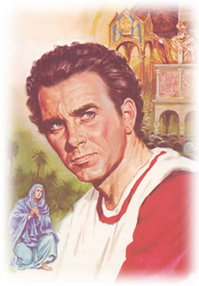 We must not imagine that it was an exceptional thing for Augustine thus to lift mind and heart above the life of the body. Any time he could spare from his daily duties and tasks, he devoted to meditation on the Sacred Scriptures he knew so well, that he might draw thence the relish and the light of truth. Rising on thought's pinions from a consideration of the works and mysteries that reveal God's surpassing love for us, he was borne aloft little by little to the Divine perfections themselves, into which he plunged--if we may so speak--as deeply as the heavenly grace given him allowed.
We must not imagine that it was an exceptional thing for Augustine thus to lift mind and heart above the life of the body. Any time he could spare from his daily duties and tasks, he devoted to meditation on the Sacred Scriptures he knew so well, that he might draw thence the relish and the light of truth. Rising on thought's pinions from a consideration of the works and mysteries that reveal God's surpassing love for us, he was borne aloft little by little to the Divine perfections themselves, into which he plunged--if we may so speak--as deeply as the heavenly grace given him allowed.
"Often I do this [he says, sharing with us his secret], this is my delight, and withdrawing from such activity as necessity imposes, I take refuge in this kind of pleasure. In all the things traversed by my mind, while I confer with Thee, I find no safe place for my soul except in Thee. In Thee are linked in unison my wandering strains. From Thee may nothing of mine depart. Sometimes, too, Thou dost admit me to a deep and unwonted interior emotion, to an indescribable sweetness. If that he brought to its perfection within me, I know of nothing which that life will not contain."
Hence it was that he cried: "Too late have I loved Thee, O beauty so ancient, yet so new! Too late have I loved Thee!"
Again, how lovingly he contemplated the life of Christ, striving to reproduce an ever more
 perfect image of it in himself and to repay love with love. In his counsel to virgins, he impressed on them the same lesson: "Let Him be fixed deep in your heart, who for you was fastened to the cross." As his love of God burned with a more ardent flame as days went on, so too did he make incredible progress in the rest of the virtues. No one can refuse his admiration to a man--whom all venerated, extolled, consulted, hearkened to for his lofty genius and sanctity--both in his writings destined for publication and in his letters, making it his great concern not only to refer to the Author of all good the praise offered himself, as being due to God alone, and to encourage and praise others, as far as truth allowed, but also to lavish honor and reverence on his colleagues in the episcopate. These were especially his mighty forerunners, such as Cyprian and Gregory of Nazianzus, Hilary and John Chrysostom, Ambrose--his master in the Faith--whom he revered as a father and whose teaching and life he was wont to recall. But especially there shone with luster in our Saint the love of souls, a love inseparable from love of God, of those souls particularly who were committed to his pastoral care.
perfect image of it in himself and to repay love with love. In his counsel to virgins, he impressed on them the same lesson: "Let Him be fixed deep in your heart, who for you was fastened to the cross." As his love of God burned with a more ardent flame as days went on, so too did he make incredible progress in the rest of the virtues. No one can refuse his admiration to a man--whom all venerated, extolled, consulted, hearkened to for his lofty genius and sanctity--both in his writings destined for publication and in his letters, making it his great concern not only to refer to the Author of all good the praise offered himself, as being due to God alone, and to encourage and praise others, as far as truth allowed, but also to lavish honor and reverence on his colleagues in the episcopate. These were especially his mighty forerunners, such as Cyprian and Gregory of Nazianzus, Hilary and John Chrysostom, Ambrose--his master in the Faith--whom he revered as a father and whose teaching and life he was wont to recall. But especially there shone with luster in our Saint the love of souls, a love inseparable from love of God, of those souls particularly who were committed to his pastoral care.
Pope Pius XI, Ad Salutem Humani (On Saint Augustine), 20 April 1930
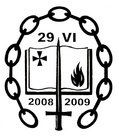 This is the summary of the Pope Benedict's catechesis on Saint Paul for Wednesday, 27 August 2008. Here is the full text of the catechesis as published on Zenit.
This is the summary of the Pope Benedict's catechesis on Saint Paul for Wednesday, 27 August 2008. Here is the full text of the catechesis as published on Zenit.
Online resources for the Year of Saint Paul can be found at the Vatican website, the Basilica of Saint Paul Outside the Walls, the U.S. Bishops Committee on Divine Worship and from Our Sunday Visitor.
Pope said:
Today's catechesis presents the life of Saint Paul, the great missionary whom the Church
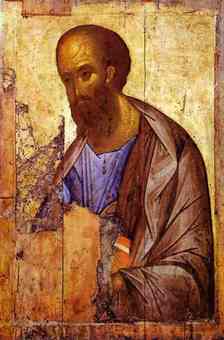 honours in a special way this year. Born a Jew in Tarsus, he received the Hebrew name "Saul" and was trained as a "tent maker" (cf. Acts 18:3). Around the age of twelve he departed for Jerusalem to begin instruction in the strict Pharisaic tradition which instilled in him a great zeal for the Mosaic Law. On the basis of this training Paul viewed the Christian movement as a threat to orthodox Judaism. He thus fiercely "persecuted the Church of God" (1 Cor 19:6; Gal 1:13; Phil 3:6) until a dramatic encounter on the road to Damascus radically changed his life. He subsequently undertook three missionary journeys, preaching Christ in Anatolia, Syria, Cilicia, Macedonia, Achaia, and throughout the Mediterranean. After his arrest and imprisonment in Jerusalem, Paul exercised his right as a Roman citizen to appeal his case to the Emperor. Though Luke makes no reference to Nero's decision, he tells us that Paul spent two years under house arrest in Rome (cf. Acts 28:30), after which--according to tradition--he suffered a martyr's death. Paul spared no energy and endured many trials in his "anxiety for all the churches" (2 Cor 11:28). Indeed, he wrote: "I do everything for the sake of the Gospel" (1 Cor 9:23). May we strive to emulate him by doing the same.
honours in a special way this year. Born a Jew in Tarsus, he received the Hebrew name "Saul" and was trained as a "tent maker" (cf. Acts 18:3). Around the age of twelve he departed for Jerusalem to begin instruction in the strict Pharisaic tradition which instilled in him a great zeal for the Mosaic Law. On the basis of this training Paul viewed the Christian movement as a threat to orthodox Judaism. He thus fiercely "persecuted the Church of God" (1 Cor 19:6; Gal 1:13; Phil 3:6) until a dramatic encounter on the road to Damascus radically changed his life. He subsequently undertook three missionary journeys, preaching Christ in Anatolia, Syria, Cilicia, Macedonia, Achaia, and throughout the Mediterranean. After his arrest and imprisonment in Jerusalem, Paul exercised his right as a Roman citizen to appeal his case to the Emperor. Though Luke makes no reference to Nero's decision, he tells us that Paul spent two years under house arrest in Rome (cf. Acts 28:30), after which--according to tradition--he suffered a martyr's death. Paul spared no energy and endured many trials in his "anxiety for all the churches" (2 Cor 11:28). Indeed, he wrote: "I do everything for the sake of the Gospel" (1 Cor 9:23). May we strive to emulate him by doing the same.
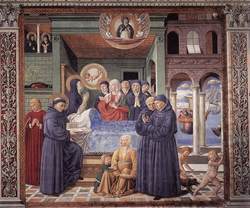 [Monica] is the unflagging prayer, the piety that does not fall asleep. She knows no great fluctuations in prayer. She is very much surrendered to God and also to the Church. The intensive dimension of her prayer lies above all in its perseverance. She is able to repeat one and the same prayer for the longest time with the same energy. Vocal prayer, for her, never becomes merely something mouthed with the lips. She possesses in fact the prayer of children, those who are able to pray in a very intensive way, but without knowing an answer will come from God, without even expecting such an answer, but also without at all thinking that no answer will come. One simply brings before God what one has to say to him, with the greatest possible love. There is not much more to it than this. (Adrienne von Speyer, Book of All Saints.)
[Monica] is the unflagging prayer, the piety that does not fall asleep. She knows no great fluctuations in prayer. She is very much surrendered to God and also to the Church. The intensive dimension of her prayer lies above all in its perseverance. She is able to repeat one and the same prayer for the longest time with the same energy. Vocal prayer, for her, never becomes merely something mouthed with the lips. She possesses in fact the prayer of children, those who are able to pray in a very intensive way, but without knowing an answer will come from God, without even expecting such an answer, but also without at all thinking that no answer will come. One simply brings before God what one has to say to him, with the greatest possible love. There is not much more to it than this. (Adrienne von Speyer, Book of All Saints.)
Let us pray. O God, the comforter of the sorrowful and the salvation of them that hope in Thee, Who had merciful regard to the pious tears of blessed Monica in bringing about the conversion of her son Augustine: grant us by their united intercession to grieve over our sins and obtain Thy merciful pardon. Through Christ our Lord.
 Communion and Liberation,
Communion and Liberation,
Meeting of the Friendship of Peoples
This year's meeting, happening right now so get to Italy fast, is built around the theme of "Either Protagonists or nobodies," seeking to reflect on the concept of the person.
In the past leaders of science, the arts, politics, economics, and the Church have gathered, including Pope John Paul II, Pope Benedict XVI, Blessed Mother Teresa of Calcutta, the founder of the Neo-Catechumenal Way, Kiko Arguello; Nobel winning scientists, leaders in economics, heads of state, and last year United States Supreme Court Justice Samuel Alito.
Pope John Paul II described the Meeting of Rimini as "explicit and conscious echo of the great mystery that the whole Church is reliving during the Jubilee year: the incarnation of the Son of God."
A defender of human reason, Father Luigi Giussani had a deep knowledge of literature and of music, and accorded great value to art as a road that leads to the Mystery. Followed by those belonging to the Movement he founded, now spread in many countries of the world, listened to with respect by many people a various faiths and various professional responsibilities, I like to remember him as a master of humanity and defender of the religiosity inscribed in the heart of the human being (Pope John Paul II).
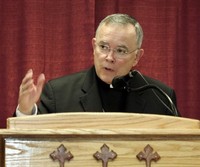 Let's start where Archbishop Charles Chaput concludes his letter to Colorado Catholics: "the duty of the state and its officials is to serve the common good, which is always rooted in moral truth. A proper understanding of the 'separation of Church and state' does not imply a separation of faith from political life. But of course, it's always important to know what our faith actually teaches."
Let's start where Archbishop Charles Chaput concludes his letter to Colorado Catholics: "the duty of the state and its officials is to serve the common good, which is always rooted in moral truth. A proper understanding of the 'separation of Church and state' does not imply a separation of faith from political life. But of course, it's always important to know what our faith actually teaches."
There seems to be a few people who, shall we say, are ignorant about what the Church teaches about abortion; some people seem invincibly ignorant when it comes to reasonable thinking on life issues and basic human rights as they think it is a matter of personal opinion and that the Church has never really and consistently that human life begins at conception. Listening to Madame Speaker Pelosi on Sunday's "Meet the Press" and in other places Senators Obama and Biden in their political rhetoric, one knows pretty quickly that what they offer is thin gruel. Those who dissent from Catholic teaching ought to be honest and state that they in fact dissent from teaching rather than claim they are "good Catholics." Contrary to Pelosi, the Church is not still making up her mind on matters pertaining to life. The fact is that Speaker Pelosi and Senator Biden, as Catholics, have not embraced the teaching and discipline of the Church. Their position, political and religious, is to publically dissent from the Church's teaching on matters of life and therefore they ought to refrain from the reception of Holy Communion until they repent. Would that the Diocesan Ordinaries of these politicians who claim to be Catholic would do their job and teach and correct error! The salvation of souls is at stake.
According to science and faith (two legitimate ways of knowing), abortion is killing an
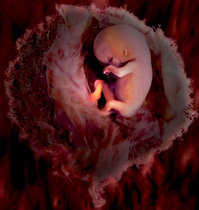 unborn human being is not a matter which is left to one's mere opinion. In the face of evidence, it is doubtful that anyone can say with conviction that abortion doesn't kill. Clearly the act of abortion revolves less around the choice of a woman to make decisions about "her" body than the fundamental idea which posits the possibility to abort a pregnancy so that a woman to be relieved of a problem or a mistake. There seems to be no reasonable way to argue with people who advocate for abortion until they see/hear the heart beat or feel the kick. The evidence, that is, the biological activity in a woman demonstrates the existence of life at conception. Just wait a month or later in a pregnancy and you will see confirmation that human existence is a fact. AND that fact is defined as a person, not a thing, nor a problem, nor a mistake.
unborn human being is not a matter which is left to one's mere opinion. In the face of evidence, it is doubtful that anyone can say with conviction that abortion doesn't kill. Clearly the act of abortion revolves less around the choice of a woman to make decisions about "her" body than the fundamental idea which posits the possibility to abort a pregnancy so that a woman to be relieved of a problem or a mistake. There seems to be no reasonable way to argue with people who advocate for abortion until they see/hear the heart beat or feel the kick. The evidence, that is, the biological activity in a woman demonstrates the existence of life at conception. Just wait a month or later in a pregnancy and you will see confirmation that human existence is a fact. AND that fact is defined as a person, not a thing, nor a problem, nor a mistake.
So the Church has been correct for two millennia when she teaches that "Abortion kills an unborn,
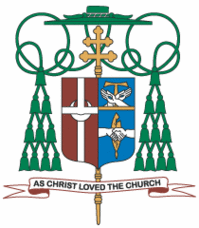 developing human life. It is always gravely evil, and so are the evasions employed to justify it. Catholics who make excuses for it - whether they're famous or not - fool only themselves and abuse the fidelity of those Catholics who do sincerely seek to follow the Gospel and live their Catholic faith."
developing human life. It is always gravely evil, and so are the evasions employed to justify it. Catholics who make excuses for it - whether they're famous or not - fool only themselves and abuse the fidelity of those Catholics who do sincerely seek to follow the Gospel and live their Catholic faith."
Read what Archbishop Chaput teaches his people and apply it to your circumstance. The teaching is correct and objective, faithful and brilliant.
Today is the 90th birthday of His Eminence, Avery Cardinal Dulles. At Fordham University's
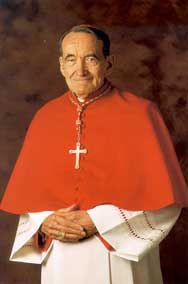 Chapel about 175 people gathered to thank God for his many blessings and to offer Thanksgiving for the life and work of this great man of the Church: The Sacrifice of the Mass was offered by the Cardinal's fellow Jesuits and some non-Jesuit priests. Family and friends, the high and the lowly and everyone in between came to celebrate with Cardinal Dulles. His longtime friend and Assistant, Sister Anne-Marie Kirmse, O.P. made today a wonderful event for many friends. No one could want nor hope for a better friend than Sister Anne-Marie!
Chapel about 175 people gathered to thank God for his many blessings and to offer Thanksgiving for the life and work of this great man of the Church: The Sacrifice of the Mass was offered by the Cardinal's fellow Jesuits and some non-Jesuit priests. Family and friends, the high and the lowly and everyone in between came to celebrate with Cardinal Dulles. His longtime friend and Assistant, Sister Anne-Marie Kirmse, O.P. made today a wonderful event for many friends. No one could want nor hope for a better friend than Sister Anne-Marie!
THE most heart-filled gesture was seeing Edward Cardinal Egan, the Archbishop of New York, pushed Cardinal Dulles in and out of the Chapel. What a perfect example of humanity!!! Later, Cardinal Egan joked at a reception that he doesn't regularly push Jesuits around much less Jesuit Cardinals, but he said it was his honor to push Dulles because of their longtime friendship and esteem; they are classmates in the College of Cardinals.
The Church gave us this prayer for the 21st Sunday Through the Year to praise God; it also
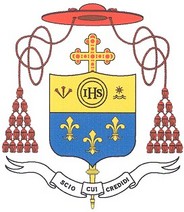 speaks to the person and work of Cardinal Dulles.
speaks to the person and work of Cardinal Dulles.
O God, You who make the minds of the faithful to be of one will,
grant unto Your people to love that thing which You command,
to desire that which You promise,
so that, amidst the vicissitudes of this world,
our hearts may there be fixed where true joys are.
(trans. Fr. John Zuhlsdorf)
I first met then Father Dulles in September 1997 at a Communio Circle in Easton, CT, hosted by the remarkable Maria Shrady. Never did I imagine what has happened to all of us since then: some that group became better theologians, some pastors of souls, some have met the Lord face-to-face, some have moved to new work and some have reached 90 years of life as a cardinal of the Holy Roman Church. Another terrific thing happened today: the opportunity to renew friendships with many whom I esteem as people and as theologians. While our Communio group has disbanded for now, we decided in 2009 to reconstitute ourselves to work on theological matters of importance under the inspiration of Dulles and under the inspiration of another venerable cardinal, Hans Urs von Balthasar (a former Jesuit I might add who died 28 June 1988).
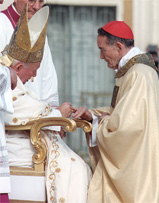 Cardinal Dulles himself in this way:
Cardinal Dulles himself in this way:
"Although I cannot rival the generous dedication of St. Paul and Ignatius of Loyola, I am, like them, content to be employed in the service of Christ and the Gospel, whether in sickness or health, in good repute or ill. I am immesurably grateful for the years in which the Lord has permitted me to serve him in a society that bears as its motto: Ad maiorum Dei gloriam. I trust that his grace will not fail me, and that I will not fail his grace, in the years to come" (A Testimonial of Grace, 50th anniv. edition).
The silent but very present witness of Avery Dulles is powerful and a strikingly stark approach than what we see in many parts of our society where the infirmed are moved to the margins of life. On the contrary, these are the people that most make present the beautiful of Jesus Christ. Personal purification and suffering continues to witness, at least to me, to the value of life and powerful presence of the Infinite. Dulles said of himself in the 39th McGinley Lecture, 21 April 2008:
The good life does not have to be an easy one, as our blessed Lord and the saints have
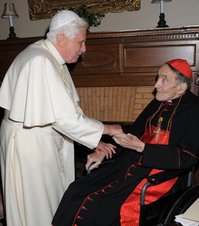 taught us. Pope John Paul II in his later years used to say, "The Pope must suffer." Suffering and diminishment are not the greatest of evils, but are normal ingredients in life, especially in old age. They are to be accepted as elements of a full human existence. Well into my 90th year I have been able to work productively. As I become increasingly paralyzed and unable to speak, I can identify with the many paralytics and mute persons in the Gospels, grateful for the loving and skillful care I receive and for the hope of everlasting life in Christ. If the Lord now calls me to a period of weakness, I know well that his power can be made perfect in infirmity. "Blessed be the name of the Lord!"
taught us. Pope John Paul II in his later years used to say, "The Pope must suffer." Suffering and diminishment are not the greatest of evils, but are normal ingredients in life, especially in old age. They are to be accepted as elements of a full human existence. Well into my 90th year I have been able to work productively. As I become increasingly paralyzed and unable to speak, I can identify with the many paralytics and mute persons in the Gospels, grateful for the loving and skillful care I receive and for the hope of everlasting life in Christ. If the Lord now calls me to a period of weakness, I know well that his power can be made perfect in infirmity. "Blessed be the name of the Lord!"
Today closes the Octave of the Assumption, the apt way to prolong the wonderful
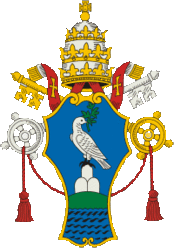 solemnity of the Blessed Mother's Assumption to heaven. In his October 11, 1954 encyclical, Ad Caeli Reginam, Pope Pius XII gave the Church the feast of the Queenship of the Blessed Virgin Mary.
solemnity of the Blessed Mother's Assumption to heaven. In his October 11, 1954 encyclical, Ad Caeli Reginam, Pope Pius XII gave the Church the feast of the Queenship of the Blessed Virgin Mary.
I think the best way to think about today feast is to read the words of the Jesuit poet Father Gerard Manley Hopkins in "The Blessed Virgin compared to the Air we Breathe." While it was composed well before Pope Pius' declaration, Hopkins captures perfectly our Catholic belief in Mary.
WILD air, world-mothering air,
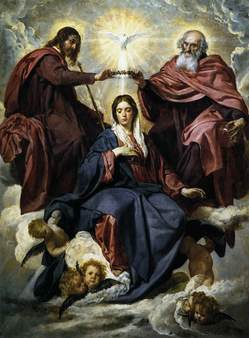 Nestling me everywhere,
Nestling me everywhere,
That each eyelash or hair
Girdles; goes home betwixt
The fleeciest, frailest-flixed
Snowflake; that 's fairly mixed
With, riddles, and is rife
In every least thing's life;
This needful, never spent,
And nursing element;
My more than meat and drink,
My meal at every wink;
This air, which, by life's law,
My lung must draw and draw
Now but to breathe its praise,
Minds me in many ways
Of her who not only
Gave God's infinity
Dwindled to infancy
Welcome in womb and breast,
Birth, milk, and all the rest
But mothers each new grace
That does now reach our race--
Mary Immaculate,
Merely a woman, yet
Whose presence, power is
Great as no goddess's
Was deemèd, dreamèd; who
This one work has to do--
Let all God's glory through,
God's glory which would go
Through her and from her flow
Off, and no way but so.
I say that we are wound
With mercy round and round
As if with air: the same
Is Mary, more by name.
She, wild web, wondrous robe,
Mantles the guilty globe,
Since God has let dispense
Her prayers his providence:
Nay, more than almoner,
The sweet alms' self is her
And men are meant to share
Her life as life does air.
If I have understood,
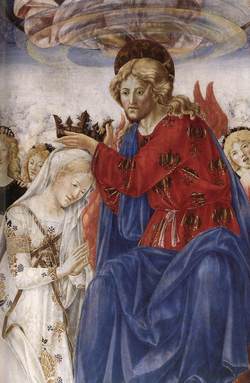 She holds high motherhood
She holds high motherhood
Towards all our ghostly good
And plays in grace her part
About man's beating heart,
Laying, like air's fine flood,
The deathdance in his blood;
Yet no part but what will
Be Christ our Saviour still.
Of her flesh he took flesh:
He does take fresh and fresh,
Though much the mystery how,
Not flesh but spirit now
And makes, O marvellous!
New Nazareths in us,
Where she shall yet conceive
Him, morning, noon, and eve;
New Bethlems, and he born
There, evening, noon, and morn--
Bethlem or Nazareth,
Men here may draw like breath
More Christ and baffle death;
Who, born so, comes to be
New self and nobler me
In each one and each one
More makes, when all is done,
Both God's and Mary's Son.
Again, look overhead
How air is azurèd;
O how! nay do but stand
Where you can lift your hand
Skywards: rich, rich it laps
Round the four fingergaps.
Yet such a sapphire-shot,
Charged, steepèd sky will not
Stain light. Yea, mark you this:
It does no prejudice.
The glass-blue days are those
When every colour glows,
Each shape and shadow shows.
Blue be it: this blue heaven
The seven or seven times seven
Hued sunbeam will transmit
Perfect, not alter it.
Or if there does some soft,
On things aloof, aloft,
Bloom breathe, that one breath more
Earth is the fairer for.
Whereas did air not make
This bath of blue and slake
His fire, the sun would shake,
A blear and blinding ball
With blackness bound, and all
The thick stars round him roll
Flashing like flecks of coal,
Quartz-fret, or sparks of salt,
In grimy vasty vault.
So God was god of old:
A mother came to mould
Those limbs like ours which are
What must make our daystar
Much dearer to mankind;
Whose glory bare would blind
Or less would win man's mind.
Through her we may see him
Made sweeter, not made dim,
And her hand leaves his light
Sifted to suit our sight.
Be thou then, O thou dear
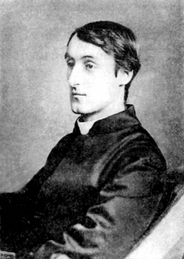 Mother, my atmosphere;
Mother, my atmosphere;
My happier world, wherein
To wend and meet no sin;
Above me, round me lie
Fronting my froward eye
With sweet and scarless sky;
Stir in my ears, speak there
Of God's love, O live air,
Of patience, penance, prayer:
World-mothering air, air wild,
Wound with thee, in thee isled,
Fold home, fast fold thy child.
The Poems of Gerard Manley Hopkins, 1918
O God, who for the defense of the Catholic faith and to restore all things in Christ, filled saint Pius, the supreme Pontiff, with heavenly wisdom and apostolic strength; mercifully grant that following his teaching and example, we may attain to our eternal reward. Through Christ our Lord.
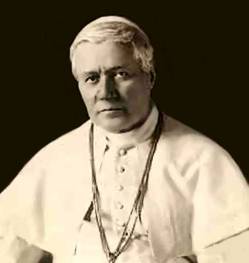
Born 2 June 1835
Ordained priest 18 September 1858
Ordained bishop 20 November 1884
Created cardinal 12 June 1983
Appointed to Venice 15 June 1893
Elected Pope 4 August 1903
Died 20 August 1914
Beatified 3 June 1951
Canonized 29 May 1954
A beautiful, but brief description of the person of Saint Pius was written by Adrienne von Speyer, in Book of All Saints. This book was recently published by Ignatius Press and it would make a great addition to your library.
Today, Father Basil and I went for a drive to Saint Paul's Abbey in Newton, New Jersey. A
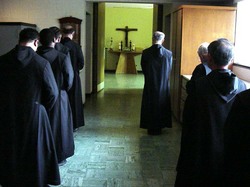 very splendid day away visiting some of his former confreres (Fr. Basil was a monk of St. Paul's before transferring his stability to St. Mary's Abbey, Morristown).
very splendid day away visiting some of his former confreres (Fr. Basil was a monk of St. Paul's before transferring his stability to St. Mary's Abbey, Morristown).
The Prior of Saint Paul's, Father Samuel, received us most graciously; we joined the monks for Mid-Day prayer and lunch. Father Basil and I spent time visiting the abbey's cemetery.
It was a delight to visit a venerable abbey such as Saint Paul's because of its monastic witness and because of its missionary work. This abbey belongs to the Saint Ottilien Congregation of monks which is a missionary congregation.
I was curious as to how many people responded to the Lord's call to serve Him as a
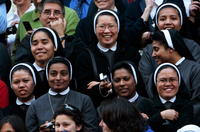 consecrated religious (being a sister, a nun or a priest) this summer. The Anchoress made a similar report on August 18; visit her blog for more info. Here is a sampling of those who took vows, promises or were invested with the habit in last calendar year.
consecrated religious (being a sister, a nun or a priest) this summer. The Anchoress made a similar report on August 18; visit her blog for more info. Here is a sampling of those who took vows, promises or were invested with the habit in last calendar year.
St. Benedict's Abbey: 1 professed simple vows; 1 professed solemn vows; 1 clothed in the habit.
St. Mary's Abbey: 1 ordained to the priesthood; 1 postulant
St. Louis Abbey: 1 solemn profession; 3 clothed in the habit; 1 claustral oblate
Mary, Help of Christians Abbey (Belmont Abbey): 1 first profession; 2 clothed in the habit
St. Meinrad Archabbey: 1 solemn vows; 3 postulants
St. Vincent Archabbey: 2 solemn professions; 4 first professions; 5 clothed in the habit; 2 ordained to the diaconate
Monastero San Benedetto: 1 solemn vows; 2 novices; 3 postulants; 1 ordination to the priesthood
Franciscan Friars of the Renewal: 7 novices; 10 first professions; 7 perpetual professions; 2 priests and 2 deacons ordained
Province of St. Joseph (the Dominicans): 11 clothed in the habit
A NEW congregation: Maronite Servants of Christ the Light: 1 sister and many more to come!
Sisters of Christian Charity: 1 first profession; 3 novices; 3 postulants
Congregation of St. Cecilia: 18 entered postulancy; 12 first vows; 8 renewed their vows; 11 made final vows; 6 clothed in the habit
Mary, Mother of the Eucharist: 14 first professions; 8 received the habit; 8 made final profession
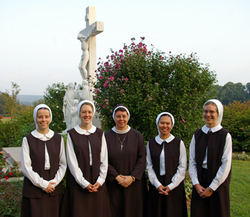 Apostles of the Sacred Heart: 2 first professions; 2 vow renewals; 1 clothed in the habit
Apostles of the Sacred Heart: 2 first professions; 2 vow renewals; 1 clothed in the habit
Queen of Peace Monastery: 1 first profession; 1 postulant
Sisters of St. Francis of the Martyr St. George : 3 postulants; 4 clothed in the habit; 6 professions; 22 Junior sisters; and an undetermined number making final vows in 2009
Valley of Our Lady Monastery (Cistercian nuns): 5 novices, 3 postulants
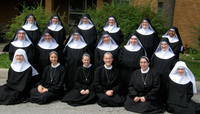 Benedictines of Mary, Queen of Apostles: 4 postulants, 2 novices
Benedictines of Mary, Queen of Apostles: 4 postulants, 2 novices
Dear friends, life is not governed by chance; it is not random. Your very existence has been willed by God, blessed and given a purpose (cf. Gen 1:28)! Life is not just a succession of events or experiences, helpful though many of them are. It is a search for the true, the good and the beautiful. It is to this end that we make our choices; it is for this that we exercise our freedom; it is in this - in truth, in goodness, and in beauty - that we find happiness and joy. Do not be fooled by those who see you as just another consumer in a market of undifferentiated possibilities, where choice itself becomes the good, novelty usurps beauty, and subjective experience displaces truth.
Pope Benedict XVI, WYD Australia, 2008
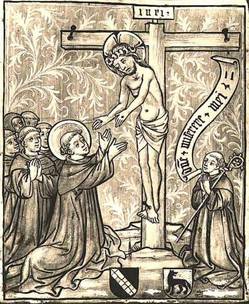
Truly it is right and just, our duty and our salvation,
always and everywhere to give you thanks,
Lord, holy Father, almighty and eternal God,
through Christ our Lord.
Christ is the Word
whom Saint Bernard held in the silence of his heart;
Christ is the Bridegroom
whom he desired with all the ardor of his soul;
Christ is the Son of the Virgin Mary
whose sweetness was his comfort and delight.
In the holy abbot Bernard you have given your Church
a teacher in the school of charity,
a prophet burning with the fire of the Holy Spirit,
a poet to sing the praises of the Virgin Mother,
a servant of unity and peace.
Even today, his words fill us with wonder,
inflame us with longing for the wedding of the Lamb,
and inspire us to sing your praise with joy.
Therefore, with the angels and the great company of saints,
we exalt your glory forever.
(Preface of the Mass of Saint Bernard)
A Rome-based news agency made a recent entry on the new head of the Pontifical Council of the Family, Ennio Cardinal Antonelli can be viewed here.
In 1973, Pope Paul created Committee for the Family and in 1981, Pope John Paul raised this committee to the rank of a "Pontifical Council." The mission, therefore of the Pontifical Council for the Family is being "...responsible for the promotion of the pastoral ministry and apostolate to the family, through the application of the teachings and guidelines of the ecclesiastical Magisterium, to help Christian families fulfill their educational and apostolic mission. It also promotes and coordinates pastoral efforts related to the issue of responsible procreation, and encourages, sustains and coordinates initiatives in defense of human life in all stages of its existence, from conception to natural death."
 Here in the US, the faithful know that in the Venerable Servant of God Father Michael J. McGivney they have a heavenly patron for the protection of families.
Here in the US, the faithful know that in the Venerable Servant of God Father Michael J. McGivney they have a heavenly patron for the protection of families.
Hence, the Knights of Columbus has as one of its hallmarks the defense of the family and it frequently stands up for the family from the vulgar attacks the family faces today. It is very clear to me that one can find no other lay Catholic organization that defends the dignity of the family than the KofC today. Also, the work of the US bishops on behalf of the family should be noted.
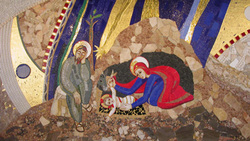 Let's pray for families especially those facing some difficulty that the protection of Mary Most Holy and of Saint Joseph will be with them. It is the desire of us all that families resist the disintegrating forces of certain elements in contemporary culture which undermine the very foundations of the family. Hence, this desire is only realized through prayer, hard work, education and courage. And as the Pope Benedict asks, "us resolve to make our own homes radiate with Christ's loving harmony and peace."
Let's pray for families especially those facing some difficulty that the protection of Mary Most Holy and of Saint Joseph will be with them. It is the desire of us all that families resist the disintegrating forces of certain elements in contemporary culture which undermine the very foundations of the family. Hence, this desire is only realized through prayer, hard work, education and courage. And as the Pope Benedict asks, "us resolve to make our own homes radiate with Christ's loving harmony and peace."
 The 6th World Encounter of Families is scheduled for 13-18 January 2009 in Mexico. It is hoped that the Pope would attend this meeting.
The 6th World Encounter of Families is scheduled for 13-18 January 2009 in Mexico. It is hoped that the Pope would attend this meeting.
I am grateful for my family  as they have been a great grace to me. My parents are married 42 years this November and this is a wonderful thing! May God grant them many more years together.
as they have been a great grace to me. My parents are married 42 years this November and this is a wonderful thing! May God grant them many more years together.
Today in Benedictine monasteries the liturgical memorial observed is that of Blessed
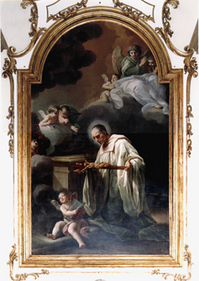 Bernard Tolomei (sometimes he is already referred to as a saint but he won't be canonized by the church later this year). From the region of Siena, Blessed Bernard was the 14th century founder of the Olivetan congregation of Benedictine monks. Bernard and his spiritual sons are known for living a life of solitude and austerity while introducing a new form of monastic observance with a congregation structure (i.e., with an elected abbot general). The Olivetan monks wear white habits in honor of Our Lady and have a special devotion to the Paschal Mystery. The congregation was founded and continues to thrive at the Archabbey of Monte Oliveto Maggiore (or here); congregation is present in the USA at the Abbey of Our Lady of Guadalupe (aka Pecos).
Bernard Tolomei (sometimes he is already referred to as a saint but he won't be canonized by the church later this year). From the region of Siena, Blessed Bernard was the 14th century founder of the Olivetan congregation of Benedictine monks. Bernard and his spiritual sons are known for living a life of solitude and austerity while introducing a new form of monastic observance with a congregation structure (i.e., with an elected abbot general). The Olivetan monks wear white habits in honor of Our Lady and have a special devotion to the Paschal Mystery. The congregation was founded and continues to thrive at the Archabbey of Monte Oliveto Maggiore (or here); congregation is present in the USA at the Abbey of Our Lady of Guadalupe (aka Pecos).
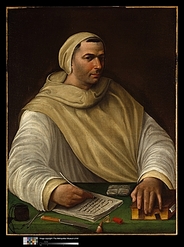 Familiarize yourself with Bernard's influence. The charism and witness of this monastic tradition is manifested in Pope John Paul's Letter to the Olivetan Benedictines. An Italian artistic and cultural society is fostered in the Bernard Tolomei Foundation.
Familiarize yourself with Bernard's influence. The charism and witness of this monastic tradition is manifested in Pope John Paul's Letter to the Olivetan Benedictines. An Italian artistic and cultural society is fostered in the Bernard Tolomei Foundation.
The Mass collects for today are help for our prayer:
Introit
I will give you shepherds after my own heart, and they shall feed you on knowledge and sound teaching. (Jer. 3:15)
Opening Prayer
Lord our God, through blessed abbot Bernard, you enriched Your Church with a new
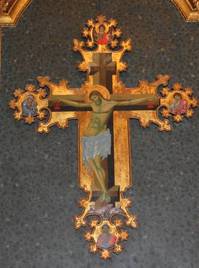 form of monastic observance. Strengthened by his help and example, may we gain the good things prepared for those who believe in You. We ask this through our Lord Jesus Christ, your Son, who lives and reigns with you and the Holy Spirit, one God, for ever and ever.
form of monastic observance. Strengthened by his help and example, may we gain the good things prepared for those who believe in You. We ask this through our Lord Jesus Christ, your Son, who lives and reigns with you and the Holy Spirit, one God, for ever and ever.Prayer Over the Gifts
Lord, accept these gifts from your people. May the Eucharist we offer to Your glory in honor of Blessed Bernard help us on our way to salvation. Grant this in the name of Jesus the Lord.
Communion antiphon
The Son of Man did not come to be served, but to serve, and to give his life as a ransom for many. (Mt. 20:28)
Prayer after Communion
Lord, we receive the bread of heaven as we honor the memory of [Blessed] St. Bernard. May the Eucharist we now celebrate lead us to eternal joys. Grant this in the name of Jesus the Lord.
A long tradition of some Benedictine monasteries is the profession of solemn vows on August 15, the Solemnity of the Assumption of the Blessed Virgin Mary. Benedictines take vows of obedience, stability, and conversion, that is, fidelity to the monastic way of life. At the Archabbey of Saint Meinrad the tradition continues to be observed.
Today at the Archabbey of Saint Meinrad,
Familiarity with the Word, which the Benedictine Rule guarantees by reserving much time for it in the daily schedule, will not fail to instill serene trust, to cast aside false security and to root in the soul a vivid sense of the total lordship of God. The monk is thus protected from convenient or utilitarian interpretations of Scripture and brought to an ever deeper awareness of human weakness, in which God's power shines brightly. ~Pope John Paul II
May God grant Brother Martin many years!
In a Georgian Hymnal we see a verse of a hymn which reads:
You went forth from the world,
O virgin Theotokos,
to the eternal light.
The sacred Liturgy bases its Marian Theology on the biblical images of Mary as the "New Eve," the
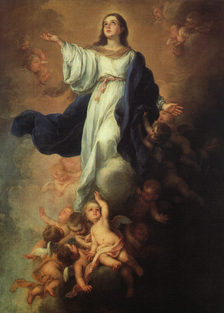 "Beloved of the Bridegroom," the "Ark of the Covenant," and the "Mother of God, the Queen of Heaven." From what we read in sacred Scripture to what we know by sacred Tradition, Mary remains the mother of mystery. Our Catholic belief is that Mary was raised up body and soul and sits in heaven with the Blessed Trinity. But was she raised up like Enoch (Genesis 5:24) or Elijah (2 King 3:11)? When Pope Pius XII declared the Assumption of Mary as a dogma of the Faith in the Apostolic Constitution Munificentissimus Deus, he deliberately left the question open, saying that Mary was assumed after "having completed the course of her earthly life." Later, Pope John Paul II said that he believes Mary, like her Son, experienced the "human drama of death." Perhaps Saint John of Damascus says it best: "As the Mother of the living God, she goes through death to Him. For if God said: 'Unless the first man put out his hand to take and taste of the tree of life, he shall live forever,' how shall she, who received the Life Himself, without beginning or end, or finite vicissitudes, not live forever."
"Beloved of the Bridegroom," the "Ark of the Covenant," and the "Mother of God, the Queen of Heaven." From what we read in sacred Scripture to what we know by sacred Tradition, Mary remains the mother of mystery. Our Catholic belief is that Mary was raised up body and soul and sits in heaven with the Blessed Trinity. But was she raised up like Enoch (Genesis 5:24) or Elijah (2 King 3:11)? When Pope Pius XII declared the Assumption of Mary as a dogma of the Faith in the Apostolic Constitution Munificentissimus Deus, he deliberately left the question open, saying that Mary was assumed after "having completed the course of her earthly life." Later, Pope John Paul II said that he believes Mary, like her Son, experienced the "human drama of death." Perhaps Saint John of Damascus says it best: "As the Mother of the living God, she goes through death to Him. For if God said: 'Unless the first man put out his hand to take and taste of the tree of life, he shall live forever,' how shall she, who received the Life Himself, without beginning or end, or finite vicissitudes, not live forever."
Looking at the consistent teaching and liturgical observance of the fact of the Assumption it is clear that the Church, East and West, has believed from the earliest days that Mary shared in her Son's dramatic victory over death by conquering death. The Apostle Paul and the prophet Isaiah called this fact "the swallowing up of death." AND this is a reason for our Hope.
Many of our Protestant brothers and sisters reject this feast as idolatry, missing what Pope
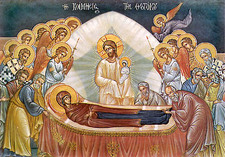 Pius said about the divine truth revealed in the Assumption: In Mary, Mothers of God, we know, "to what lofty goal our bodies and souls are destined." The Church, therefore, prays at Mass this collect:
Pius said about the divine truth revealed in the Assumption: In Mary, Mothers of God, we know, "to what lofty goal our bodies and souls are destined." The Church, therefore, prays at Mass this collect:
Almighty and Eternal God, You Who assumed the Immaculate Virgin Mary, the Mother of Your Son, body and soul into heavenly glory, grant, we beseech You, that, always intent on higher things, we may merit to be sharers in her glory.
And the Preface
Since today the Virgin Mother of God was assumed into heaven
as the beginning and pattern of your Church's perfection
and a sign of sure hope and comfort to your pilgrim people,
For justly you would not allow her
to see the corruption of the tomb,
because from her own flesh she brought forth ineffably
your incarnate Son, the author of all life.
(Draft 2006 I.C.E.L. Translation)
Dominican sisters based in Nashville start new mission in Australia
NASHVILLE, Tenn. (CNS) -- The 12 months spent by three U.S. Dominican sisters
 in
Sydney, Australia, to help plan and organize World Youth Day has led to a new mission in Australia for the congregation. The three -- Sisters Mary Madeline Todd, Mary Rachel Capets and Anna Wray -- are members of the St. Cecilia Congregation in Nashville. They have returned home but two of them will go back to Sydney to help establish their community's first permanent mission outside the United States. Cardinal George Pell and Auxiliary Bishop Anthony Fisher of Sydney, a fellow Dominican, "we're eager to have our sisters working in Sydney," said Sister Mary Madeline. "What we could offer and what they needed were complementary." What the Dominicans offer and what is needed in southern Australia, Sister Mary Madeline said, is a "witness of religious life." Although Australian society has become increasingly secular, "there is a great interest in religious life in Australia," Sister Mary Madeline told the Tennessee Register, newspaper of the Nashville Diocese.
in
Sydney, Australia, to help plan and organize World Youth Day has led to a new mission in Australia for the congregation. The three -- Sisters Mary Madeline Todd, Mary Rachel Capets and Anna Wray -- are members of the St. Cecilia Congregation in Nashville. They have returned home but two of them will go back to Sydney to help establish their community's first permanent mission outside the United States. Cardinal George Pell and Auxiliary Bishop Anthony Fisher of Sydney, a fellow Dominican, "we're eager to have our sisters working in Sydney," said Sister Mary Madeline. "What we could offer and what they needed were complementary." What the Dominicans offer and what is needed in southern Australia, Sister Mary Madeline said, is a "witness of religious life." Although Australian society has become increasingly secular, "there is a great interest in religious life in Australia," Sister Mary Madeline told the Tennessee Register, newspaper of the Nashville Diocese.
On another note, the Nashville Dominicans finally professed 11 sisters on July 25th. May God grant many years!
If you are interested in knowing more about the Nashville Dominicans, send an email to Sister Mary Emily at: vocation@op-tn.org
The Blessing of Herbs and Flowers in Honor of the Assumption of the Blessed Virgin Mary
After the Asperges if it is a Sunday, otherwise immediately before Mass, the priest, standing before the altar and facing the people who hold the sheaves of new grain, garden vegetables, flowers and new herbs and the finest fruits of their orchards in their hands, says in a clear voice:
P: Our help is in the name of the Lord.
All: Who made heaven and earth.
Pray Psalm 64
P; Glory be to the Father.
All: As it was in the beginning.
P: The Lord will be gracious.
All: And our land will bring forth its fruit.
P: You water the mountains from the clouds.
All: The earth is replenished from your rains.
P: Giving grass for cattle.
All: And plants for the benefit of man.
P: You bring wheat from the earth.
All: And wine to cheer man's heart.
P: Oil to make his face lustrous.
All: And bread to strengthen his heart.
P: He utters a command and heals their suffering.
All: And snatches them from distressing want.
P: O Lord, hear my prayer.
All: And let my cry come unto you.
P: The Lord be with you.
All: And with your spirit.
Let us pray. Almighty everlasting God, who by your word alone brought into being the
 heavens, earth, sea, things seen and things unseen, and garnished the earth with plants and trees for the use of man and beast; who appointed each species to bring forth fruit in its kind, not only for the food of living creatures, but for the healing of sick bodies as well; with mind and word we urgently call on you in your great kindness to bless + these various herbs and fruits, thus increasing their natural powers with the newly given grace of your blessing. May they keep away disease and adversity from men and beasts who use them in your name; through Christ our Lord.
heavens, earth, sea, things seen and things unseen, and garnished the earth with plants and trees for the use of man and beast; who appointed each species to bring forth fruit in its kind, not only for the food of living creatures, but for the healing of sick bodies as well; with mind and word we urgently call on you in your great kindness to bless + these various herbs and fruits, thus increasing their natural powers with the newly given grace of your blessing. May they keep away disease and adversity from men and beasts who use them in your name; through Christ our Lord. All: Amen.
Let us pray. God, who through Moses, your servant, directed the children of Israel to carry their sheaves of new grain to the priests for a blessing, to pluck the finest fruits of the orchard, and to make merry before you, the Lord their God; hear our supplications, and shower blessings + in abundance upon us and upon these bundles of new grain, new herbs, and this assortment of produce which we gratefully present to you on this festival, blessing + them in your name. Grant that men, cattle, flocks, and beasts of burden find in them a remedy against sickness, pestilence, sores, injuries, spells, against the fangs of serpents or poisonous creatures. May these blessed objects be a protection against
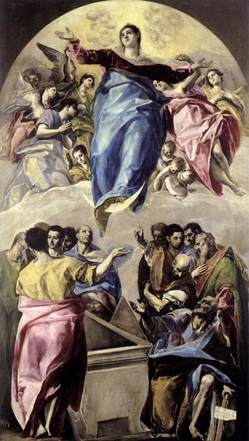 diabolical mockery, cunning, and deception wherever they are kept, carried, or otherwise used. Lastly, through the merits of the blessed Virgin Mary, whose Assumption we are celebrating, may we all, laden with the sheaves of good works, deserve to be taken up to heaven; through Christ our Lord.
diabolical mockery, cunning, and deception wherever they are kept, carried, or otherwise used. Lastly, through the merits of the blessed Virgin Mary, whose Assumption we are celebrating, may we all, laden with the sheaves of good works, deserve to be taken up to heaven; through Christ our Lord. All: Amen.
Let us pray. God, who on this day raised up to highest heaven the rod of Jesse, the Mother of your Son, our Lord Jesus Christ, that by her prayers and patronage you might communicate to our mortal nature the fruit of her womb, your very Son; we humbly implore you to help us use these fruits of the soil for our temporal and everlasting welfare, aided by the power of your Son and the prayers of His glorious Mother; through Christ our Lord. All: Amen.
And may the blessing of almighty God, Father, Son, + and Holy Spirit, come upon these creatures and remain always.
All: Amen.
They are sprinkled with holy water and incensed.
Today's the feast of the martyr Saint Maximilian Kolbe (January 8, 1894-August 14,
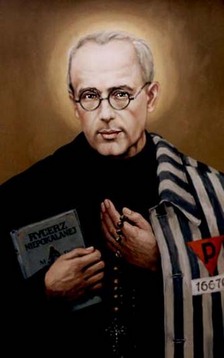 1941), the Apostle of Consecration to Mary. Pope Benedict reminded us recently that the death of Kolbe was a witness of the love which "defeats the darkness of egoism and hatred." The Holy Father recalled words attributed Saint Maximilian Kolbe: "Hatred is not a creative force: only love is." On August 14, 1941, the saint died in place of Franciszek Gajowniczek.
1941), the Apostle of Consecration to Mary. Pope Benedict reminded us recently that the death of Kolbe was a witness of the love which "defeats the darkness of egoism and hatred." The Holy Father recalled words attributed Saint Maximilian Kolbe: "Hatred is not a creative force: only love is." On August 14, 1941, the saint died in place of Franciszek Gajowniczek.
When Pope John Paul II canonized Kolbe in the presence of Franciszek Gajowniczek he said that Saint Maximilian Kolbe was not a confessor, but a martyr. He is one of ten 20th-century martyrs from across the world who are depicted in statues above the Great West Door of Westminster Abbey, London.
Saint Maximilian is the patron saint for those living with drug addictions, the imprisoned people, journalists, political prisoners, prisoners, and the pro-life movement.
Kolbe is a special saint for me because from my school days his image and story were imprinted in my mind and heart by the Nazareth sisters. How could the story of Fr. Kolbe not move you? When I visited the Nazi concentration camps in 1996, and prayed in Kolbe's cell, his offering was very present to me. Through Kolbe's intercession before the Throne of Grace we ask for world peace and peace in our hearts.
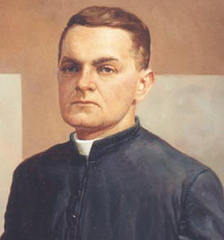 118 years ago the Venerable Servant of God Michael J. McGivney died at the age of 38. A diocesan priest of the Hartford Diocese and founder of the Knights of Columbus, McGivney urged holiness and missionary activity with the Knights and his parishioners. The only way to manage this is to adhere 100% to Jesus Christ.
118 years ago the Venerable Servant of God Michael J. McGivney died at the age of 38. A diocesan priest of the Hartford Diocese and founder of the Knights of Columbus, McGivney urged holiness and missionary activity with the Knights and his parishioners. The only way to manage this is to adhere 100% to Jesus Christ.
The prayer for canonization is an excellent summary of McGivney's work and a challenge for us to similarly respond to God and service of neighbor. The McGivney Guild which promotes McGivney's cause for sainthood by giving relevant information on Fr. McGivney and it has a number of devotional items to encourage devotion to him. The Guild publishes a newsletter 6 times per year. Membership is open to all people and free.
Prayer for the Canonization of
Father Michael J. McGivney
God, our Father, protector of the poor and defender of the widow and orphan, you called your priest, Father Michael J. McGivney, to be an apostle of Christian family life and to lead the young to the generous service of their neighbor.
Through the example of his life and virtue may we follow your Son, Jesus Christ, more closely, fulfilling his commandment of charity and building up his Body which is the Church. Let the inspiration of your servant prompt us to greater confidence in your love so that we may continue his work of caring for the needy and the outcast.
We humbly ask that you glorify your servant Father Michael J. McGivney on earth according to the design of your holy will.
Through his intercession, grant the favor I now present (here make your request).
Through Christ our Lord. Amen.
Saint Dominic's Monastery is where a group of Dominican nuns --not to be confused with the
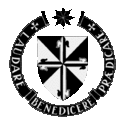 third order sisters like Nashville Dominicans or Sisters of Mary, Mother of the Eucharist-- are beginning a new life in Linden, Virginia, and they ought to be on your radar screen. The monastery is 12 miles from Christendom College and a short distance from Washington, DC.
third order sisters like Nashville Dominicans or Sisters of Mary, Mother of the Eucharist-- are beginning a new life in Linden, Virginia, and they ought to be on your radar screen. The monastery is 12 miles from Christendom College and a short distance from Washington, DC.
The nuns need our prayerful solidarity, vocations and material support. What's more beautiful than a life dedicated to following the Gospel of Jesus Christ in the charism of Saint Dominic by faithfulness to a life of sacrifice, worship, study and community life? The nuns live what is considered a traditional Dominican nuns' life with the night office, the traditional habit, community life and abstinence. Their life is not easy but they it is beautiful, happy and rewarding. The monastery will be blessed (dedicated) and the nuns formally enclosed by the bishop of the Dicoese of Arlington, The Most Reverend Paul Stephen Loverdi on October 7, 2008, the feast of the Holy Rosary.
A great story of monastic adventure may be found at Roman Catholic Vocations blog.
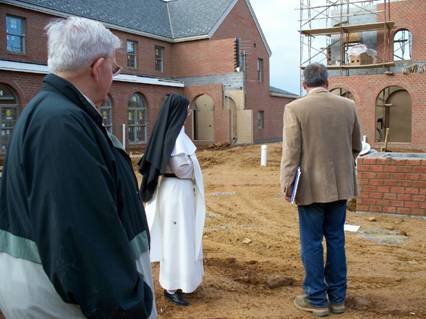
The abbey has an apple orchard though there are plum and peach trees, too. St. Mary's Abbey moved from Newark to Morristown in 1927 and the apple orchard was planted in the early 1940's. And from the looks of it, some trees may be about 60 years old and still
 producing fruit.
producing fruit.
The orchard has been under the care of Abbot Brian, the retired 7th abbot of St. Mary's Abbey, for about 30+ years. As St. Paul said, if you don't work you don't eat; so I work because I like to eat. For the monk working has two aspects: the work of the soul (the Divine Office and Mass) and the work of the hand. Since Abbot Brian is away--and I like working outside in a garden --I've been spending time in the orchard cutting back weeds around the trees and the fence line. Good work to do because it keeps me connected to the land. I also think it's in my blood since my paternal grandfather, Julius, was a farmer (and he worked for US steel) but my dear father claims not to have gotten THAT gene. That's evident at home when he mows the lawn and "cares" for my flowers. In any event, time in the orchard brings memories of my grandfather to mind in many ways. For instance, the fact that I am working in an orchard reminds me of his NY farm, there is a 1947 Ford tractor used here and grandpa had the exact same one, and there's the presence of honey bees, fox and deer. More on the bees later....
 Tonight after Vigils (Office of Readings) I went to the orchard to pray my rosary --as I am wont to do because of the scenery. With St. Fiacre at my side and praying the Sorrowful Mysteries of the rosary, I had some unexpected company: a red fox and 4 deer. Oh, thank God for nature!
Tonight after Vigils (Office of Readings) I went to the orchard to pray my rosary --as I am wont to do because of the scenery. With St. Fiacre at my side and praying the Sorrowful Mysteries of the rosary, I had some unexpected company: a red fox and 4 deer. Oh, thank God for nature!

Today's Catholic News Service reports that Cardinal Newman's body will be moved
LONDON (CNS) -- The British government has agreed to allow the exhumation of the
 body of a 19th-century cardinal whose cause for sainthood widely is expected to progress soon to beatification. The Ministry of Justice granted a license to allow undertakers to dig up the body of Cardinal John Henry Newman from a grave in a small cemetery in the suburbs of Birmingham, England, and transfer it to a marble sarcophagus in a church in the city, where it can be venerated by pilgrims. The license was expected to arrive Aug. 11, the 118th anniversary of the cardinal's death in 1890. Approval had been delayed by several months because of a 19th-century law that forbids the transfer of bodies from graves to church tombs. But Sir Suma Chakrabarti, permanent secretary to the Ministry of Justice, finally decided to make a special exception to allow the exhumation to go ahead. Born in London in 1801, Cardinal Newman was an Anglican priest who led the Oxford movement in the 1830s to draw Anglicans to their Catholic roots. He converted to Catholicism at the age of 44 after a succession of clashes with Anglican bishops made him a virtual outcast from the Church of England.
body of a 19th-century cardinal whose cause for sainthood widely is expected to progress soon to beatification. The Ministry of Justice granted a license to allow undertakers to dig up the body of Cardinal John Henry Newman from a grave in a small cemetery in the suburbs of Birmingham, England, and transfer it to a marble sarcophagus in a church in the city, where it can be venerated by pilgrims. The license was expected to arrive Aug. 11, the 118th anniversary of the cardinal's death in 1890. Approval had been delayed by several months because of a 19th-century law that forbids the transfer of bodies from graves to church tombs. But Sir Suma Chakrabarti, permanent secretary to the Ministry of Justice, finally decided to make a special exception to allow the exhumation to go ahead. Born in London in 1801, Cardinal Newman was an Anglican priest who led the Oxford movement in the 1830s to draw Anglicans to their Catholic roots. He converted to Catholicism at the age of 44 after a succession of clashes with Anglican bishops made him a virtual outcast from the Church of England.The Venerable Servant of God John Henry Newman
The Venerable Servant of God John Henry Newman was born in London, 21 February
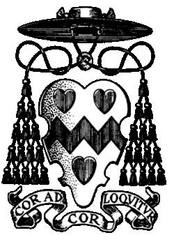 1801, and died Birmingham, 11 August 1890. As Vicar of Saint Mary's Oxford he exerted a profound spiritual influence on the Church of England. Accepting true faith as professed and taught by the Catholic Church in 1845, he founded Oratories of Saint Philip Neri in Birmingham (1848) and later in London (1849) and was the first rector of the Catholic University in Dublin. Newman was made a Cardinal by Pope Leo XIII in 1879. Through his published writings and private correspondence he created a greater understanding of the Catholic Church and her teachings, helping many persons with their religious difficulties. At his death he was praised for his unworldliness, humility, and prayerful contact with God. Pope John Paul II declared Newman a "Venerable Servant of God" on 22 January 1991. At the 2nd century of the Cardinal's birth Pope John Paul wrote:
1801, and died Birmingham, 11 August 1890. As Vicar of Saint Mary's Oxford he exerted a profound spiritual influence on the Church of England. Accepting true faith as professed and taught by the Catholic Church in 1845, he founded Oratories of Saint Philip Neri in Birmingham (1848) and later in London (1849) and was the first rector of the Catholic University in Dublin. Newman was made a Cardinal by Pope Leo XIII in 1879. Through his published writings and private correspondence he created a greater understanding of the Catholic Church and her teachings, helping many persons with their religious difficulties. At his death he was praised for his unworldliness, humility, and prayerful contact with God. Pope John Paul II declared Newman a "Venerable Servant of God" on 22 January 1991. At the 2nd century of the Cardinal's birth Pope John Paul wrote:
For his [Newman] tomb he chose the inscription: Ex umbris et imaginibus in veritatem; and it was clear at the end of his life's journey that Christ was the truth he had found. But Newman's search was shot through with pain. Once he had come to that unshakeable sense of the mission entrusted to him by God, he declared: "Therefore, I will trust Him... If I am in sickness, my sickness may serve Him, in perplexity, my perplexity may serve Him... He does nothing in vain... He may take away my friends. He may throw me among strangers. He may make me feel desolate, make my spirits sink, hide the future from me. Still, He knows what He is about" (Meditations and Devotions). All these trials he knew in his life; but rather than diminish or destroy him they paradoxically strengthened his faith in the God who had called him, and confirmed him in the conviction that God "does nothing in vain". In the end, therefore, what shines forth in Newman is the mystery of the Lord's Cross: this was the heart of his mission, the absolute truth which he contemplated, the "kindly light" which led him on.
Prayer for Canonization John Henry Newman
Eternal Father, You led John Henry Newman to follow the kindly light of Truth, and he obediently responded to your heavenly calls at any cost. As writer, preacher, counsellor and educator, as pastor, Oratorian, and servant of the poor he labored to build up your Kingdom.
Grant that through your Vicar on Earth we may hear the words, 'Well done, thou good and faithful servant, enter into the company of the canonized saints.'
May you manifest your Servant's power of intercession by even extraordinary answers to the prayers of the faithful throughout the world. We pray particularly for our intentions in his name and in the name of Jesus Christ your Son our Lord. Amen.
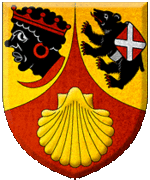 On Friday, 8 August 2008, the Congregation for Divine Worship and the Discipline of the Sacraments communicated to the relevant ecclesial authorities (i.e., Bishops' Conferences and therefore Diocesan Bishops) that the Holy Father in accord with the same congregation and the Congregation for the Doctrine of the Faith, the norms for the liturgical use of "...the Divine Name signified in the sacred tetragrammaton...." The document is called "Letter to the Bishops' Conferences on the 'Name of God'" (Prot. N. 213/08/L). The directives are clear and concise. The Letter is issued under the signatures of Francis Cardinal Arinze and Archbishop Albert Malcolm Ranjith and dated 29 June 2008. The directives:
On Friday, 8 August 2008, the Congregation for Divine Worship and the Discipline of the Sacraments communicated to the relevant ecclesial authorities (i.e., Bishops' Conferences and therefore Diocesan Bishops) that the Holy Father in accord with the same congregation and the Congregation for the Doctrine of the Faith, the norms for the liturgical use of "...the Divine Name signified in the sacred tetragrammaton...." The document is called "Letter to the Bishops' Conferences on the 'Name of God'" (Prot. N. 213/08/L). The directives are clear and concise. The Letter is issued under the signatures of Francis Cardinal Arinze and Archbishop Albert Malcolm Ranjith and dated 29 June 2008. The directives:
1. In liturgical celebrations, in songs and prayers the name of God in the form of the
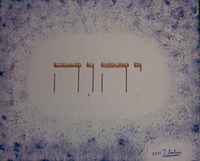 tetragrammaton YHWH is neither to be used or pronounced.
tetragrammaton YHWH is neither to be used or pronounced.
2. For the translation of the Biblical text in modern languages, destined for liturgical usage of the Church, what is already prescribed by n. 41 of the Instruction Liturgiam authenticam is to be followed; that is, the divine tetragrammaton is to be rendered by the equivalent of Adonai/Kyrios: "Lord", "Signore", "Seigneur", "Herr", "Señor", etc.
3. In translating, in the liturgical context, texts in which are present, one after the other, either the Hebrew term Adonai or the tetragrammaton YHWH, Adonai is to be translated "Lord" and the form "God" is to be used for the tetragrammaton YHWH, similar to what happens in the Greek translation of the Septuagint and in the Latin translation of the Vulgate.
The cardinal and the archbishop explain in the first part of the letter the value of remaining faithful to the consistent teaching and tradition of the Church. Here one can say that in following this teaching Catholics have continuity of faith: legem credendi lex statuat supplicandi (often abbreviated by the bromide of lex orandi, lex crendendi). The implication of this teaching, therefore, has much to do with Christology, liturgical theology, catechetics and interfaith dialogue with our Jewish brothers and sisters. I think the final paragraph bears prayerful consideration because of the Church's objectivity:
Avoiding pronouncing the tetragrammaton of the name of God on the part of the Church has therefore its own grounds. Apart from a motive of a purely philological order, there is also that of remaining faithful to the Church's tradition, from the beginning, that the sacred tetragrammaton was never pronounced in the Christian context nor translated into any of the languages into which the Bible was translated.
As commentary, the teaching presented by the Church was taught to me and my classmates at Notre Dame High School (W. Haven, CT) in Mr. William Parkinson's Old Testament class in 1983. So, I think we were fortunate to have had the correct catechesis and praxis at that time in our Church's history. Having said this, I wonder about the arrogance (perhaps mere ignorance?) of Christians using of the Divine Name incorrectly and I wonder how long it will take publishers to change their editorial policy. I am thinking of the dreadful liturgical songs still used in parishes.
 After the Angelus on August 3, 2008, the Holy Father Pope Benedict XVI said:
After the Angelus on August 3, 2008, the Holy Father Pope Benedict XVI said:
Dear Friends,
Next Friday, 8 August, the 29th Olympic Games will begin in Beijing. I am pleased to
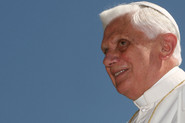 address to the host Country, to the organizers and to the participants, and first of all to the athletes, my cordial greeting and the hope that each one may give of his or her best in the genuine Olympic spirit. I am following with deep interest this great sports event - the most important and anticipated in the world - and I warmly hope that it will offer the international community an effective example of coexistence among people of the most different provenances, with respect for their common dignity. May sports once again be a pledge of brotherhood and peace among peoples!
address to the host Country, to the organizers and to the participants, and first of all to the athletes, my cordial greeting and the hope that each one may give of his or her best in the genuine Olympic spirit. I am following with deep interest this great sports event - the most important and anticipated in the world - and I warmly hope that it will offer the international community an effective example of coexistence among people of the most different provenances, with respect for their common dignity. May sports once again be a pledge of brotherhood and peace among peoples!
But not all is what it seems to be. One has to wonder how sincere the Chinese government is when there is still evidence of human rights violations and an abuse of power when dealing with religion. Not only are the Tibetans troubled by Chinese control but also Catholics and other Christian groups. The Games' slogan "One World, One Dream" is laughable in front of reality. Whose dream is the Chinese government proposing to realize?
Then there is the matter of freedom of information, that is, lack of adequate and free exchange of ideas. It is a fact many Catholic websites are unable to be accessed in China today. Some of them are the websites of Vatican Radio, the diocese of Hong Kong, the Korean Church and AsiaNews.
And the puzzling thing is seeing a Catholic bishop carrying an Olympic torch on July 31st.
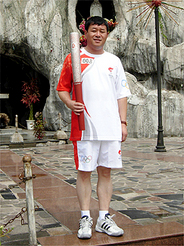 The UCA News reported that Coadjutor Bishop Peter Fang Jianping of Tangshan (Vatican approved) has become the first Catholic bishop to carry the Olympic torch on its way to Beijing. This gesture follows after a Catholic priest did the same in June. While the political issues are always complex the fact remains, Catholics are not free to worship or organize in China and some bishops and priests remain under arrest. It seems to me that Bishop Peter was hoodwinked.
The UCA News reported that Coadjutor Bishop Peter Fang Jianping of Tangshan (Vatican approved) has become the first Catholic bishop to carry the Olympic torch on its way to Beijing. This gesture follows after a Catholic priest did the same in June. While the political issues are always complex the fact remains, Catholics are not free to worship or organize in China and some bishops and priests remain under arrest. It seems to me that Bishop Peter was hoodwinked.
Prayer for Olympics
Everlasting God, giver of joy and source of abundant life,
we pray for all who are involved in the Beijing Olympic Games,
and especially those who represent the United Startes of America:
for their safe-keeping and well-being;
and as we celebrate the skill and resolve of those who compete
we pray that, throughout the Games, there would be
a striving for excellence,
a spirit of humility and fair play,
and a respect for others,
and that all who wait on you may find their strength renewed
in Jesus Christ our Lord. Amen.
Prayer courtesy of Rev'd Peter Moger, The Church of England but edited
Each year, just after Easter, Monsignor Lorenzo Albacete and Communion and Liberation
 leads a retreat for priests. This year's theme is "Priests of the New Evangelization." In 2009, the retreat for priests is being held at The Malvern Retreat House (Malvern, PA) from 13-17 April 2009.
leads a retreat for priests. This year's theme is "Priests of the New Evangelization." In 2009, the retreat for priests is being held at The Malvern Retreat House (Malvern, PA) from 13-17 April 2009.
Yes, it is very early to think about events in 2009. But sit too long on making plans for your retreat in 2009 and you'll miss a great opportunity to meet the Lord and to be guided by Msgr. Albacete. Act now!!!!
The notes from the 2008 retreat are now available. Visit the CL webpage.
What is Communion and Liberation? In short, CL is a group of friends seeking the face of Jesus and working out their salvation, as St. Paul says, together. It is an ecclesial movement founded by Monsignor Luigi Giussani in 1954 and officially approved by Pope John Paul II in 1982; it is made up of laity, priests and sisters.
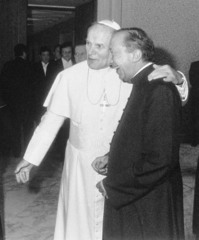 The essence of the charism given to Communion and Liberation can be signaled by three factors.
The essence of the charism given to Communion and Liberation can be signaled by three factors.
· first of all, the announcement that God became man (the wonder, the reasonableness, the enthusiasm for this): "The Word was made flesh and dwells among us."
· secondly, the affirmation that this man - Jesus of Nazareth dead and risen - is a present event in a "sign" of "communion," i.e., of unity of a people guided, as a guarantee, by a living person, ultimately the Bishop of Rome;
· thirdly: only in God made man, man, therefore only in His presence and, thus only through - in some way - the experienceable form of His presence (therefore, ultimately only within the life of the Church) can man be truer and mankind be truly more human. St Gregory Nazianzen writes, "If I were not Yours, my Christ, I would feel like a finished creature". It is thus from His presence that both morality and the passion for the salvation of man (which is mission) spring up.
The summer provides us with many notable opportunities to honor some great saints: Benedict, Ignatius, Peter Emyard, Augustine and the Lancaster Martyrs. Today the Church remembers Saint Dominic, a 13th century friar who set the world ablaze in the love of Christ.
On Saint Dominic's deathbed he gave his brothers his last will and testament: "Have
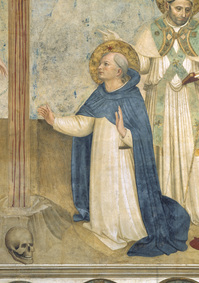 charity, guard humility, hold fast to voluntary poverty." Dominic promised them that he would be of more use to them in heaven than on Earth--a promise I believe he keeps even today but he has a lot of work to do yet. Our beloved father was buried according to his wishes, "under the feet of his brethren." Saint Dominic was canonized in 1234 by Pope Gregory IX.
charity, guard humility, hold fast to voluntary poverty." Dominic promised them that he would be of more use to them in heaven than on Earth--a promise I believe he keeps even today but he has a lot of work to do yet. Our beloved father was buried according to his wishes, "under the feet of his brethren." Saint Dominic was canonized in 1234 by Pope Gregory IX.Following is a letter by Robert Kilwardby, an English friar of the Order of Preachers. He was Oxford educated, a popular teacher, held numerous positions in the Order, was the archbishop of Canterbury, he crowned Edward I as King of England, and he is known to publically oppose the works of his fellow friar, Saint Thomas Aquinas because of his use of Aristotle. This "Letter to Novices" provides an insight into heart of the Order of Preachers and thus into person of Saint Dominic.
Brother Robert, to the novices of the Order of Preachers, beloved in Christ: May you be enlightened by the grace of the sevenfold Spirit through your pursuit of holiness.
Consider your calling and notice its characteristics, so that you may magnify the Lord and exult in God our Savior.
First of all, you should know that, before our Order arose, certain holy people were vouchsafed revelations from God, which we now have in writing, showing that the prayer of the glorious Virgin obtained this Order from her Son, when he was angry at the sins of the world, for the reconciliation of sinners. And it is not unreasonable to believe that it is from her too that the Order's progress and advancement and its guidance and preservation come. This has often been revealed from on high. So let us embrace our state of life all the more carefully, seeing how devotedly we ought to love such a patron, guardian and guide as we have in her, and how keenly we ought to honor her and how humbly we ought to reverence her.
Then you should know that this Order resembles the state of life the apostles, and that which our Savior deigned to display in his earthly life. Of him it is written, "Jesus began to preach and to teach, 'Do penance, for the kingdom of heaven has come close.'" And again: "Jesus went about all the towns round about, teaching.'" Then he also laid his this job upon his disciples, saying, "Go into the world and preach the gospel." And the apostle says, "He has put in us the word of reconciliation," beseeching people for the sake of Christ, "Be reconciled to God." Now what else, I ask you, does the Order of Preachers do, as it goes round so solicitously preaching the gospel and reconciling sinners?
So those who are called by a divine prompting to such a state of life ought rightly to boast in Christ, seeing that they desire to apply themselves to carrying out the very job of Christ himself and his apostles.
But some, who profess other states of life, say, "We too are likewise preachers, just as much as the members of the Order of Preachers." To them we reply, in accordance with the truth, that there are indeed people in other states of life who preach, but they do not do it in the same way. For the friars of the Order of Preachers do it by virtue of the institution of their Order, by virtue of their job which gives them their name; others do it, certainly, but in imitation of them, because they cannot find anything better or more useful that they could do. So what our Order does essentially by virtue of its original institution, others try to do in imitation, incidentally and beside their formal profession. So we, who have been chosen precisely for this purpose, should rejoice that we are right, in virtue of our foundation, what others imitate out of devotion.
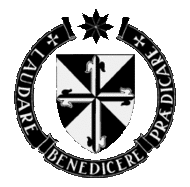 Then you should notice the usefulness of our state of life, my beloved novices. In this, unless I am mistaken, our state of life ought, on any true calculation, to be preferred to all others. For all our Chapters and discussions and debates and all the Order's study aim at nothing else than to prepare people and to make them fit for the salvation of souls, and, when they are prepared and equipped in their way of life and in knowledge, to direct them to the task of converting sinners. So I reckon that no other Order works as hard in its concern for this as ours does, or achieves so much by its work.
Then you should notice the usefulness of our state of life, my beloved novices. In this, unless I am mistaken, our state of life ought, on any true calculation, to be preferred to all others. For all our Chapters and discussions and debates and all the Order's study aim at nothing else than to prepare people and to make them fit for the salvation of souls, and, when they are prepared and equipped in their way of life and in knowledge, to direct them to the task of converting sinners. So I reckon that no other Order works as hard in its concern for this as ours does, or achieves so much by its work. Therefore, those who have such a vocation ought rightly to rejoice, since it is well known that at the last judgment the reward is to be meted out in accordance with what a man merits by his useful labor.
In addition to this, please look thoroughly at the special arrangements made in this Order about penance and austerity. The brethren of this Order are not prevented from edifying their neighbors in the fierce cold by the torment of having to go barefooted, nor, on the other hand, do they receive the comfort of going barefooted in the heat of summer. Also when they go out they do not enjoy the luxuries and delicacies of worldly cuisine. We believe that they reason for the first point, in God's plan, is to avoid being prevented in any way from teaching people. The second and third points are to given an example of the austerity involved in salutary penance and of the perseverance in it. The one is necessary of truth is to be made known, the other is give an example of how to live.
Who would not cleave to such a state of life, once he had tasted its savor in his spirit?
If a question arises about poverty, on which many people vaunt themselves, I consider that our state is the one which is truly to be praised. Who would dare deny that the poverty of Christ and his disciples was more perfect than that of any other? Well, we read that most perfectly holy company of Christ and his disciples had purses and carried in them what they were given for their livelihood and brought food for them. We know that the Order of Preachers lives in just the same way, with the addition that they own houses and gardens and schools to hold their teaching in.
At this point some people claim that they possess nothing at all, either in common or individually, they hold no cash or money either in their own persons or through intermediaries, which is a far higher degree of poverty than the one I have been describing, which I said belonged to the company of the apostles. To this we reply that we do not wish nor should we wish to engage in quarrels, so we readily grant that their profession is as they say it is; may they do well in keeping it thoroughly! But it is enough for us in this regard not to go beyond the perfection of that apostolic poverty which Christ taught in the gospel.
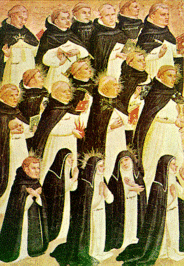 In addition, I would point out that nobody ought to regard himself as superior to the rest because of his material poverty, unless he is conscious of being more poor in spirit than the rest. It does not say, "Blessed are the poor in things," but "Blessed are the poor in spirit." If there are any who regard themselves as better than the rest because of their state of poverty because of this make less of others or reduce them in the eyes of men, then they ought to ask themselves whether they can reasonably be said to possess that poverty of spirit, in which humility resides, without seeking to make itself public, and in which humility resides, without charity too principally resides, which seeks always to commend other people.
In addition, I would point out that nobody ought to regard himself as superior to the rest because of his material poverty, unless he is conscious of being more poor in spirit than the rest. It does not say, "Blessed are the poor in things," but "Blessed are the poor in spirit." If there are any who regard themselves as better than the rest because of their state of poverty because of this make less of others or reduce them in the eyes of men, then they ought to ask themselves whether they can reasonably be said to possess that poverty of spirit, in which humility resides, without seeking to make itself public, and in which humility resides, without charity too principally resides, which seeks always to commend other people. And, finally, since neither receiving nor possessing is a vice, nor is non-possession or non-receiving a virtue -it is the use of things which matters: if it is intemperate it is vicious, if it is temperate it is virtuous -what good is it boastfully to regard yourself as better than anyone else just on the strength of not receiving or not possessing anything, as if this constituted a more excellent state, when it is in fact indifferent, as far as vice and virtue are concerned?
So if anyone is to boast, it should be people who reckon that they excel in poverty because of their more sparing and temperate use of things, always provided that they attribute this to Christ and do not wish to be known in order to be praised, nor to be preferred to others in such a way that the others are despised; for it is the case, not only have they not won their reward, but because they have jettisoned humility and charity, they will actually be in a state of sin.
So let Christ's poor receive and possess what is necessary for this mortal life, saving always the apostolic principle, which the Savior and his disciples observed, "Having food and enough clothing to cover them, with this let them be content."
Maybe some wag will say, "Why, then, do you possess books and church furnishings, which are neither food nor clothing"? to this the answer is that the text of the apostle, "Having food, etc," refers to people's bodily life but this objection raises a matter of a person's own spiritual benefit and that of his neighbor. The apostle did not neglect his books. And the primitive church established the principle of the faithful living together and having things in common, the first of which is necessary if the truth is to be preached, the second to give form to charity; for the first, there is no doubt that books are needed, and for the second, where men live together in a common life, church furnishings are needed.
Having said all this, to foster love of our state of life, we must go on to say that we should despise nobody and no state of life; it is profitless to fuss over human statutes and neglect the command of God which bids us love our neighbor as ourselves -on which St. Augustine teaches that "neighbor" must be taken to mean everybody. So let no individual person or state of life be found to be debarred from our love, which we have in God, because in commanding us to love even our enemies, he plainly showed that he wanted no one at all to be excluded from love. So, far from us be all detraction, criticism, insult, gossip or cursing, whether of people or any state of life, far from us be all comparisons at the expense of others. If we hear anyone telling stories of this kind or insinuating criticisms, we should rebuke him and deny him our attention, turning our faces sadly away from him. For, though we are bound by charity to commend our state in accordance with truth, we cannot detract from any other state.
From The Early Dominicans, Paulist Press
|
Transfiguration |
|
|
|
|
|
For stranger to admire; |
|
A serious aspect, but it burn'd |
|
With no unearthly fire. |
|
|
|
Thy speech was rare and high; |
|
And yet it vex'd my burden'd breast, |
|
And scared, I knew not why. |
|
|
|
On face, and form, and air; |
|
God's living glory round thee blazed-- |
|
A Saint--a Saint was there! |
|
John Henry Newman |
|
|
|
|
|
Lift up your eyes on high, |
|
For there He doth the Sign accord |
|
Of His bright majesty. |
|
|
|
That shall outlive all time, |
|
Older than depth or starry height, |
|
Limitless and sublime. |
|
|
|
And heathen tribes decreed, |
|
The King to Abraham pledged of old |
|
And his unfailing seed. |
|
|
|
And witness'd when He came, |
|
The Father speaks to all the earth |
|
To hear, and own His name. |
|
|
|
To babes His beaming face, |
|
Be, with the Father, endless praise, |
|
And with the Spirit of grace. Amen. |
A Matins Hymn
John Henry Newman
Aleksandr Isayevich Solzhenitsyn was born in Kislovodsk, a Caucasus town known for its
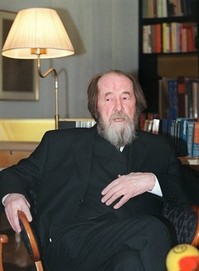 spas. Mr. Solzhenitsyn was born on December 11, 1918 and died, Sunday, August 3, 2008. The cause of death was a heart condition.
spas. Mr. Solzhenitsyn was born on December 11, 1918 and died, Sunday, August 3, 2008. The cause of death was a heart condition.
Mr. Solzhenitsyn returned to Russia on May 27, 1994, after settling in the hamlet of Cavendish, Vermont, for 18 years. He never became an American citizen while the rest of the family did.
His return to Russia was a dramatic event; beginning in Vladivostok where "he and his family began a two-month journey by private railroad car across Russia, to see what his post-Communist country now looked like. The BBC was on hand to film the entire passage and pay for it."
In 1970, Solzhenitsyn won the Nobel prize laureate. Among his memorable literary works were: One Day in the Life of Ivan Denisovich (1963), The Cancer Ward (1968), A Lenten Letter to Pimen, Patriarch of All Russia (1972), The Nobel Lecture on Literature (1972), Candle in the Wind (1973), The Gulag Archipelago, 1918-1956: an Experiment in Literary Investigation (1974).
Mr. Solzhenitsyn was to be buried at the Donskoi monastery in Moscow today after a Russian Orthodox funeral service with no state funeral ceremony. The L'Osservatore Romano paid tribute to this great conscience. Also, Andrew Cusack has written a marvelous piece on Mr. Solzhenityn; take the time and read it. May his memory be eternal!
Sometimes you can get inspired by reading the blogs. Today, Fr. Mark posted on his blog the Apostolic Exhortation Haerent Animo by Saint Pius X.
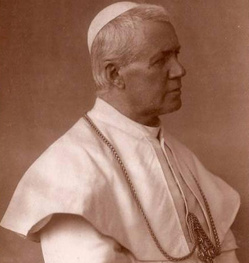 Given that today is the 100th anniversary of the exhortation's publication and the feast of Saint John Baptist Mary Vianney, reading Haerent Animo was excellent spiritual reading. It took me the better of the morning to ponder what the saintly pontiff was saying, not because the prose was difficult, or the concepts too mysterious but because I kept stopping to reflect on my concrete experience of priestly formation and thinking of the lives of priests I know. I was sadly dwelling on the problems the priesthood has had in recent years.
Given that today is the 100th anniversary of the exhortation's publication and the feast of Saint John Baptist Mary Vianney, reading Haerent Animo was excellent spiritual reading. It took me the better of the morning to ponder what the saintly pontiff was saying, not because the prose was difficult, or the concepts too mysterious but because I kept stopping to reflect on my concrete experience of priestly formation and thinking of the lives of priests I know. I was sadly dwelling on the problems the priesthood has had in recent years.
In writing this exhortation on the occasion of his 50th anniversary of priesthood, the Pope is taking seriously his "responsibility of forming Christ in others." So, what's revolutionary about Haerent Animo? Nothing! AND that's the point. We already know what we have to do to be men of God, holy priests, men of "high dignity" called to be priests, i.e., servants of the Lord and the Church. A good reminder is helpful. Therefore, objectivity the pope presents in Haerent Animo relates to the following work one has to do if a holy priesthood is to exist. The Pope re-proposes:
-daily examination of conscience
-daily celebration of the august rites of the Church with beauty by proper preparation spiritually and intellectually
-daily prayer, particularly the Divine Office
-frequent confession of mortal and venial sins
-self denial
-seeking the Lord's clemency
-yearly retreat with others
-Lectio Divina (attentive reading of sacred Scripture)
-develop good friendships
The point is that the priest's conduct must be stellar for fear of causing scandal in others. But fear of causing scandal ought not be the criterion for doing what the Pope re-proposes: the encounter with honesty, faithfulness, love and Christ ought to be included. Say it another way, an overgrown plant will bear no fruit. So our responsibility is to be watchful, be vigilant, and pray. This work will lead us closer to Christ in His words and in His actions; this work will lead to a deeper friendship with the Lord; doing this work will lead to holiness of life.
One thing the pope mentions is forming priestly associations to create a closer union among priests, to help one another in difficult times, to develop a taste of sacred learning, to have a solicitude for each other's vocation, and to identify the skills needed to effectively preach the Gospel. It is a fact if one wants to be "good priest" then it being a part of such associations from the first day of one's ordination. Either join a group or found one: But do something. Seminarians in the Archdioceses of Denver Saint Paul-Minneapolis recently founded priestly associations of type such as Saint Pius recommends.
I recommend that you read Haerent Animo soon. It will be good for you!
Faith in Jesus Christ as Lord and Savior was brought to Egypt by the Evangelist Saint Mark around the year AD 50. Many would consider Saint Mark as the first bishop and patriarch of Egypt. Our Christian brothers and sisters in Egypt,
known as Copts, both Catholic and Orthodox, are being threatened by the Muslim majority. Of 80 million Egyptians 10 percent are Christian.
Of this 10 percent, the Orthodox outweigh the Catholics. To give you an example, the 2007 statistics show that there are 7 Catholic dioceses (eparchies) caring for the spiritual and human needs of 161,327 souls. The Saturday edition of the NY Times carried a story with a slide show about the plight of these spiritual sons and daughters of Saint Mark.
being threatened by the Muslim majority. Of 80 million Egyptians 10 percent are Christian.
Of this 10 percent, the Orthodox outweigh the Catholics. To give you an example, the 2007 statistics show that there are 7 Catholic dioceses (eparchies) caring for the spiritual and human needs of 161,327 souls. The Saturday edition of the NY Times carried a story with a slide show about the plight of these spiritual sons and daughters of Saint Mark.
 Consider supporting the excellent work that the Catholic Near East Welfare Association
(CNEWA), a papal agency for humanitarian and pastoral support. Your prayer and financial resources would be welcomed.
Consider supporting the excellent work that the Catholic Near East Welfare Association
(CNEWA), a papal agency for humanitarian and pastoral support. Your prayer and financial resources would be welcomed.
May St. Mark and St. Menas pray for us.
Today is the feast of a great bishop, founder and doctor of the Church, Saint Alphonsus
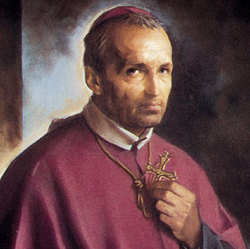 Ligouri (1696-1787). The saint's spiritual, dogmatic, liturgical and systematic writings are remarkable sources of inspiration and challenge. Little recognized but nontheless true is Saint Alphonsus was a poet and a musician. After all, the saint is from Naples! It is reported that Giuseppe Verdi said of St. Alphonsus' great Christmas carol: "Christmas without 'Tu Scendi Dalle Stelle' is not Christmas."
Ligouri (1696-1787). The saint's spiritual, dogmatic, liturgical and systematic writings are remarkable sources of inspiration and challenge. Little recognized but nontheless true is Saint Alphonsus was a poet and a musician. After all, the saint is from Naples! It is reported that Giuseppe Verdi said of St. Alphonsus' great Christmas carol: "Christmas without 'Tu Scendi Dalle Stelle' is not Christmas."
Among the writings that you'll find helpful are his Way of the Cross, Visits to the Blessed Sacrament, The Moral Theology and The Glories of Mary.
For our lectio I propose the following:
Perfection is founded entirely on the love of God: "Charity is the bond of perfection"; and perfect love of God means the complete union of our will with God's: "The principal effect of love is so to unite the wills of those who love each other as to make them will the same things." It follows then, that the more one unites his will with the divine will, the greater will be his love of God. Mortification, meditation, receiving Holy Communion, acts of fraternal charity are all certainly pleasing to God -- but only when they are in accordance with his will. When they do not accord with God's will, he not only finds no pleasure in them, but he even rejects them utterly and punishes them.
Conformity to God's Will
St. Alphonsus Maria de Ligouri
O God, Who did inflame blessed Alphonsus Your confessor and Bishop with a burning zeal for the salvation of souls and through him did enrich Your Church with new offspring; grant we beseech You, that imbued with his wholesome precepts and strengthened by his example, we may come happily unto You.
Blessed Mother Teresa of Calcutta taught: "God needs our poverty, not our abundance. These are means of being humble:
-
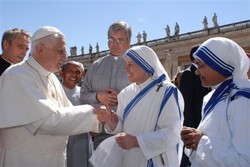 Speak as little as possible about oneself;
Speak as little as possible about oneself; - Take care of one's personal matters
- Avoid curiosity;
- Do not meddle in the affairs of others;
- Accept contradictions with good humor;
- Do not focus on the faults of others;
- Accept reproach, even if undeserved;
- Yield to the will of others;
- Accept insults and abuse;
- Accept feeling uncared for, forgotten, despised;
- Be courteous and sensitive, even if someone provokes you;
- Do not try to be admired and loved;
- Do not hide behind one's own dignity;
- Yield in arguments, even if one is right;
- Always choose what is most difficult."
